A Life in Tea: The Untold Stories of the Malaiyaha Tamil Hill Country Tea Plantation Worker Community – A Solo Art Exhibition by Arulraj Ulaganathan Paying Tribute to Tea Workers / At the Harold Pieris Gallery, Lionel Wendt Art Center, Colombo, Sri Lanka
– an exhibition showcasing the resilience and heritage of tea workers
| CasualWalker’s Rating for A Life in Tea: The Untold Stories of the Malaiyaga Tamil Hill Country Tea Plantation Worker Community: | |

9.9 – Great / Excellent |
|
How does one find belonging in a place that doesn’t truly belong to them? How does this sense of belonging evolve over time? And how does one find solace in that journey? These are the reflections explored in Arulraj Ulaganathan’s solo art exhibition, which chronicles his experiences as a member of the Malaiyaga / Malaiyaha Tamil hill country tea plantation worker community in Sri Lanka. Through his work, Arulraj addresses the themes of dispossession, landlessness, and a metaphorical journey toward a home that he contributed to but doesn’t fully own or belong to.
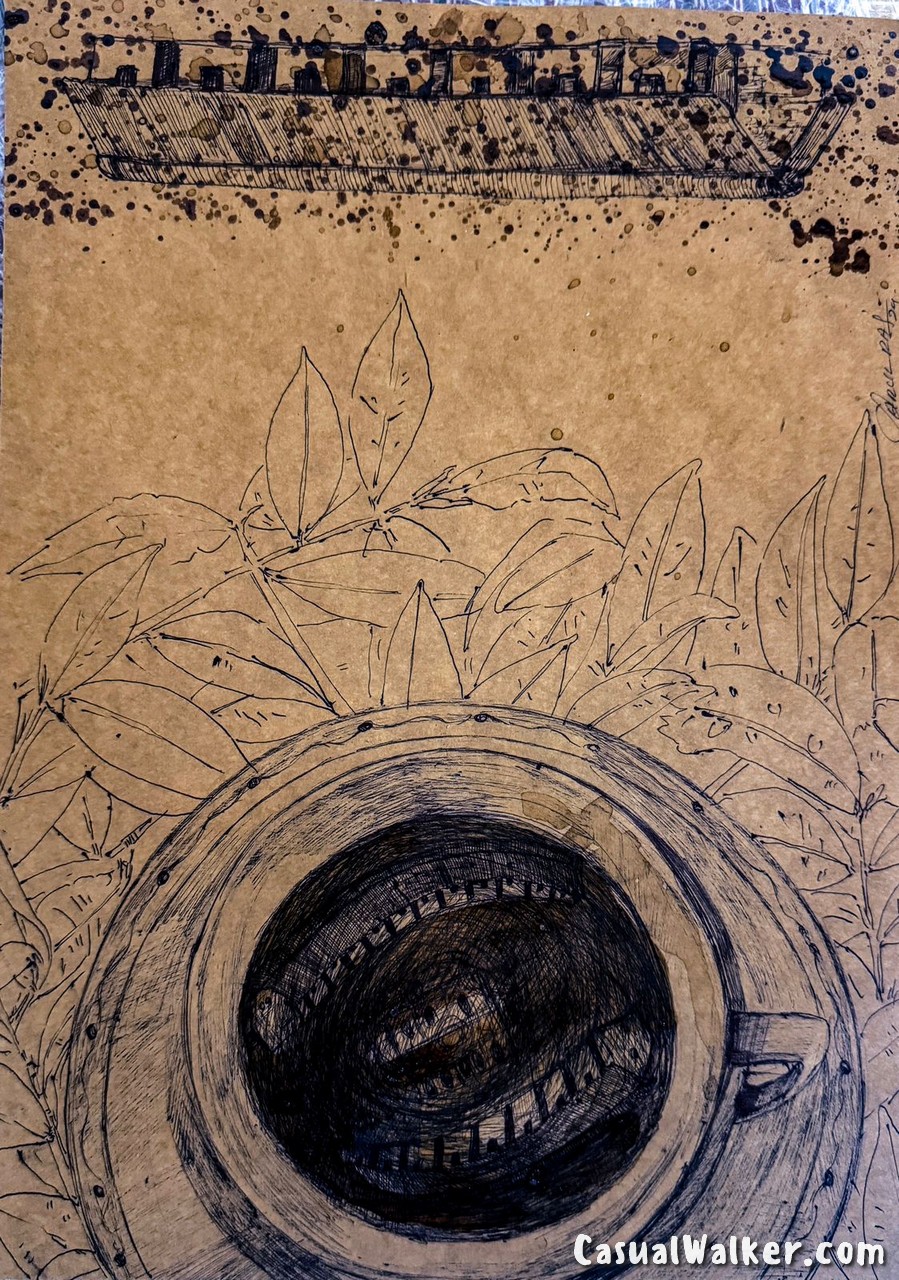
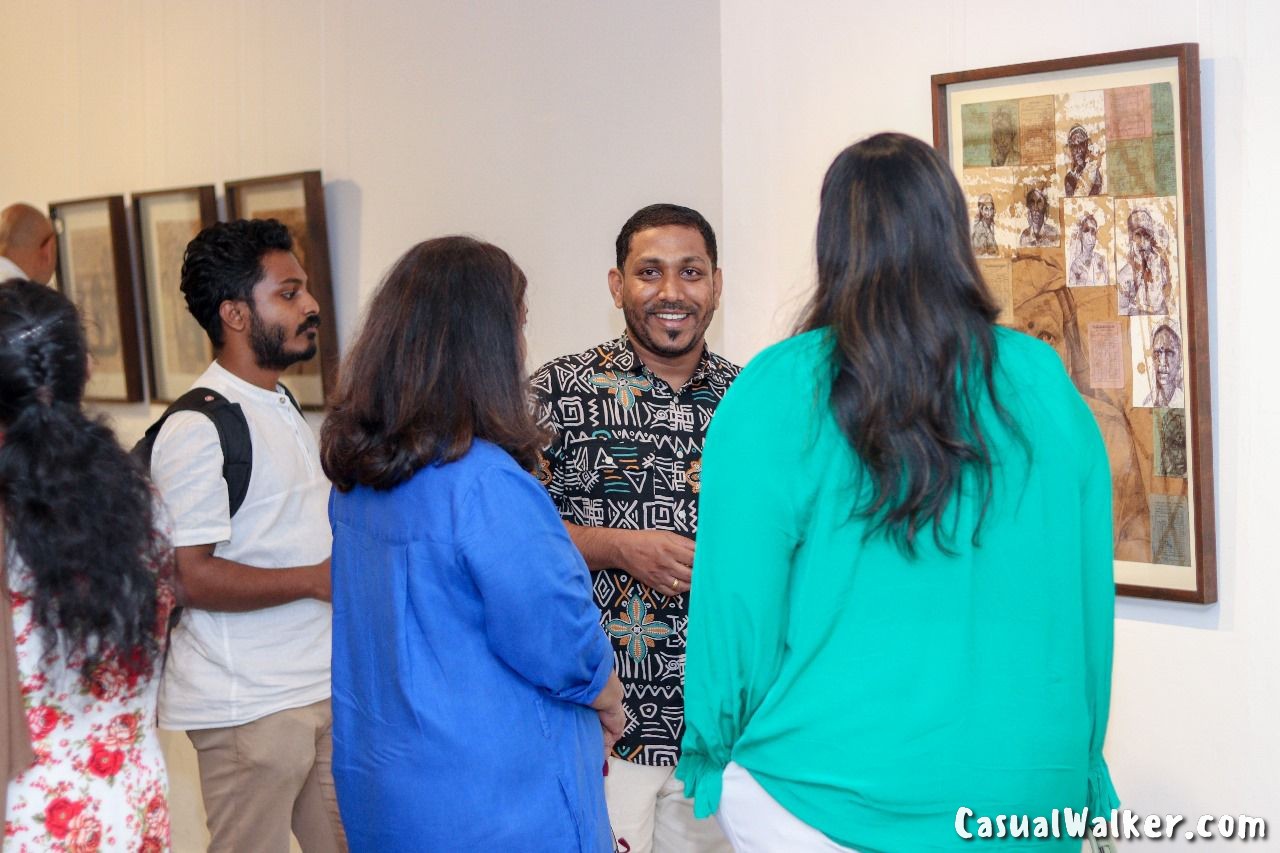
Arulraj canvases, created in four series, blend the brown, rusted hues of tea stains with various mediums, including acrylic, pen, pencil, name cards, and leveling knives. These pieces depict the past, present, and future of his community’s struggle.
He specializes in printmaking, drawing, and painting. His visuals tell the stories of struggle and survival experienced by his parents, extended family, and ancestors, all of whom worked as tea plantation laborers. He studied at Haputale Tamil Central College, earned his BFA from Pondicherry University in India, and completed his MFA at the Government College of Fine Arts in Chennai. His artistic practice is deeply influenced by the “haunting echoes of colonial tea plantations,” where ecological scars, forced labor, systemic violence, and the restrictive architectures of the Haputale hills linger as painful legacies. This exhibition highlights Arulraj’s journey as an artist who, despite facing numerous obstacles, developed a practice shaped both literally and metaphorically by his upbringing.
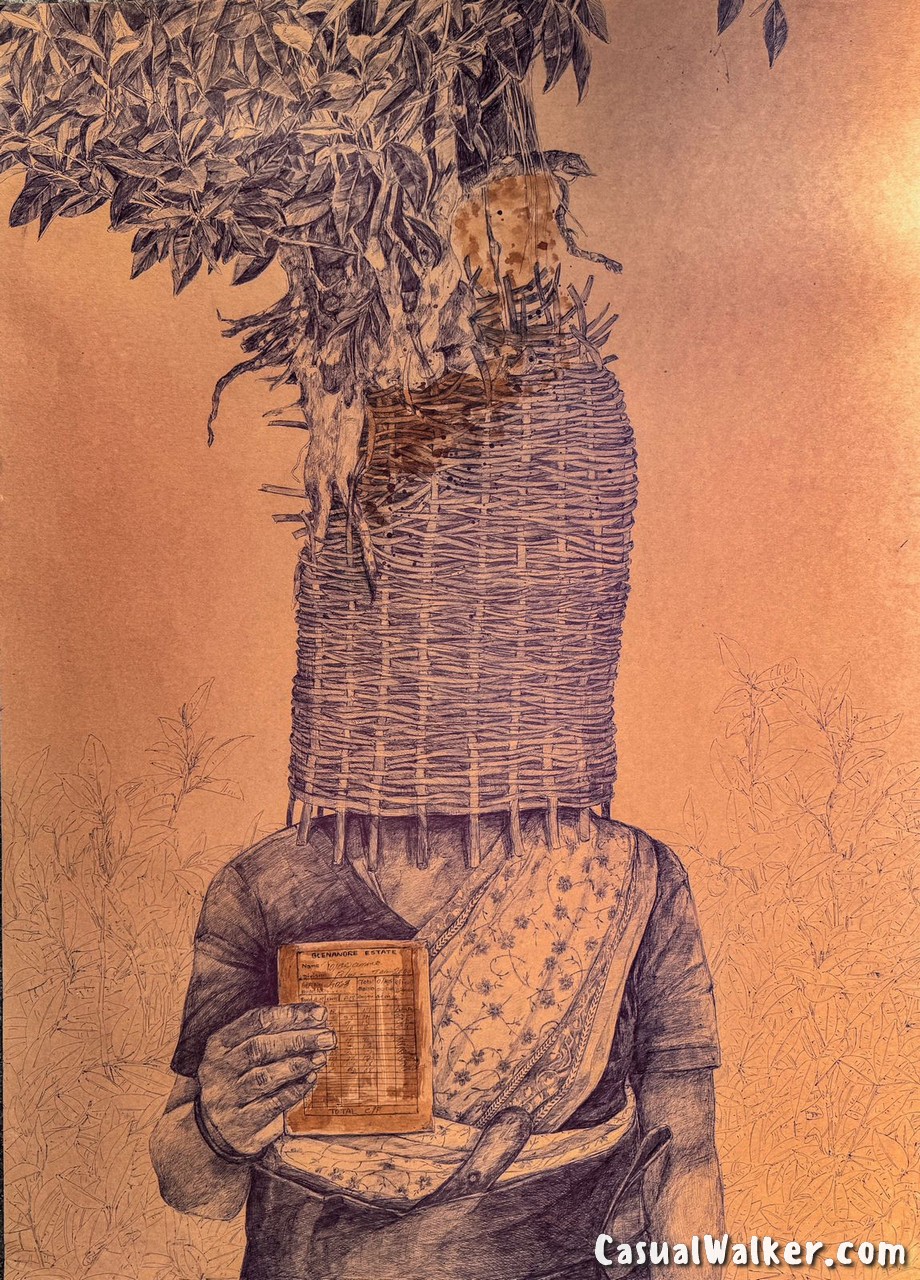
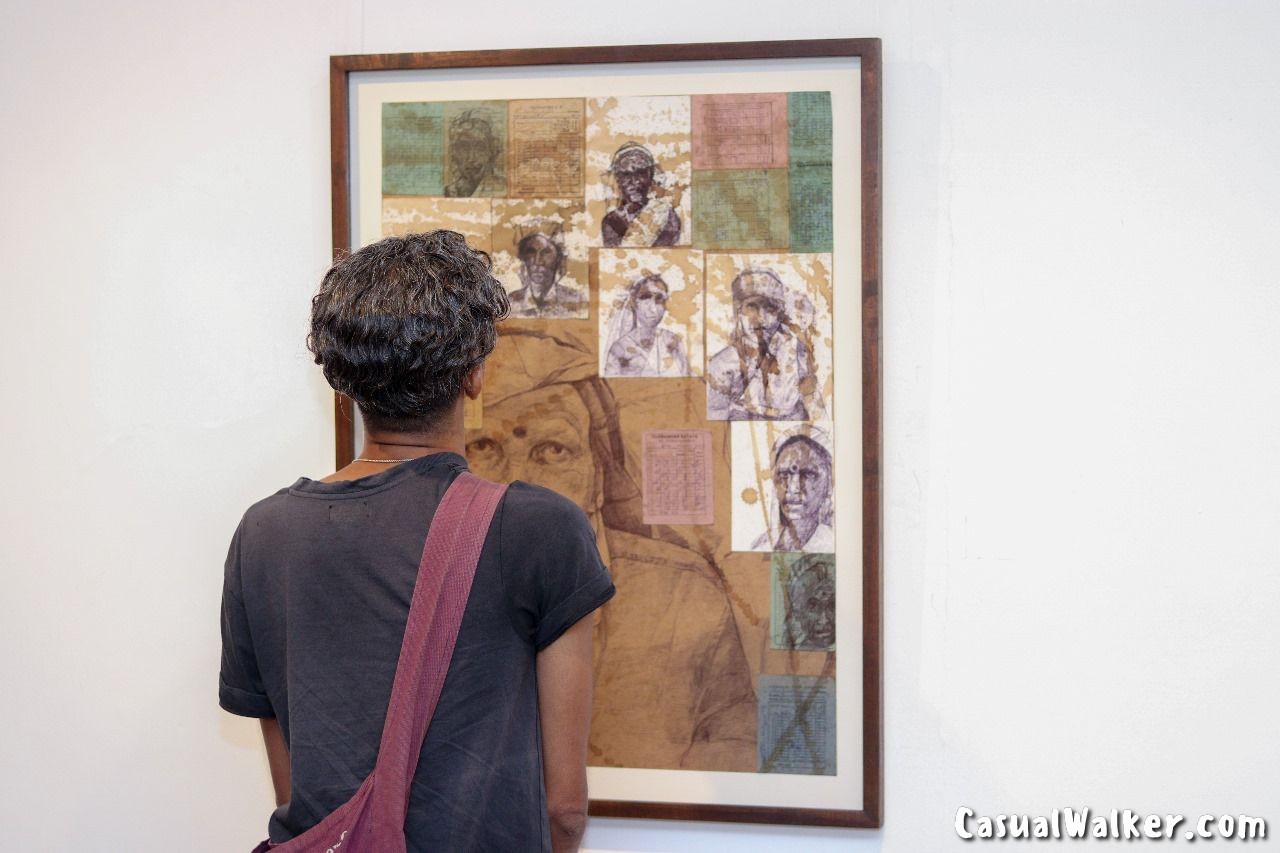
This exhibition marks Arulraj’s debut as a solo artist. His previous works have been showcased in group exhibitions, including *Colomboscope: Way of the Forest* (2024), *Fragile: to commemorate the un-commemorated* at the JDA Perera Art Gallery (2023), and the *Kochi Muziris Student Biennale* (2018).
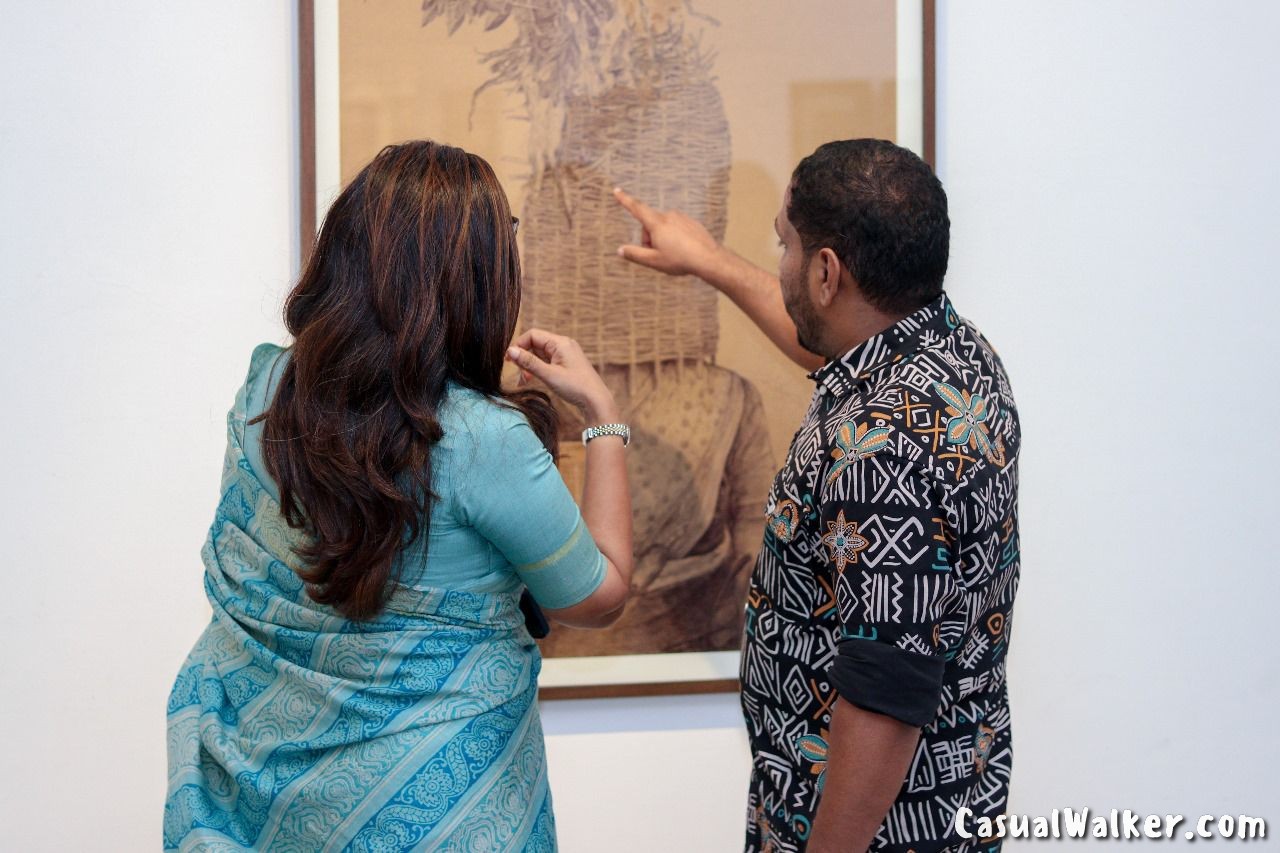
Pullakambura is one of the series, featuring recurring motifs such as the woven basket carried by tea pluckers, from which infants emerge surrounded by tea flowers. This symbolizes Arulraj’s childhood in Haputale, where he recalls the basket as a source of comfort, a representation of his mother’s safety as a tea plantation worker. He spent time waiting for her in a daycare center, or *pullakambura*, a place he remembers as lonely and full of misery.
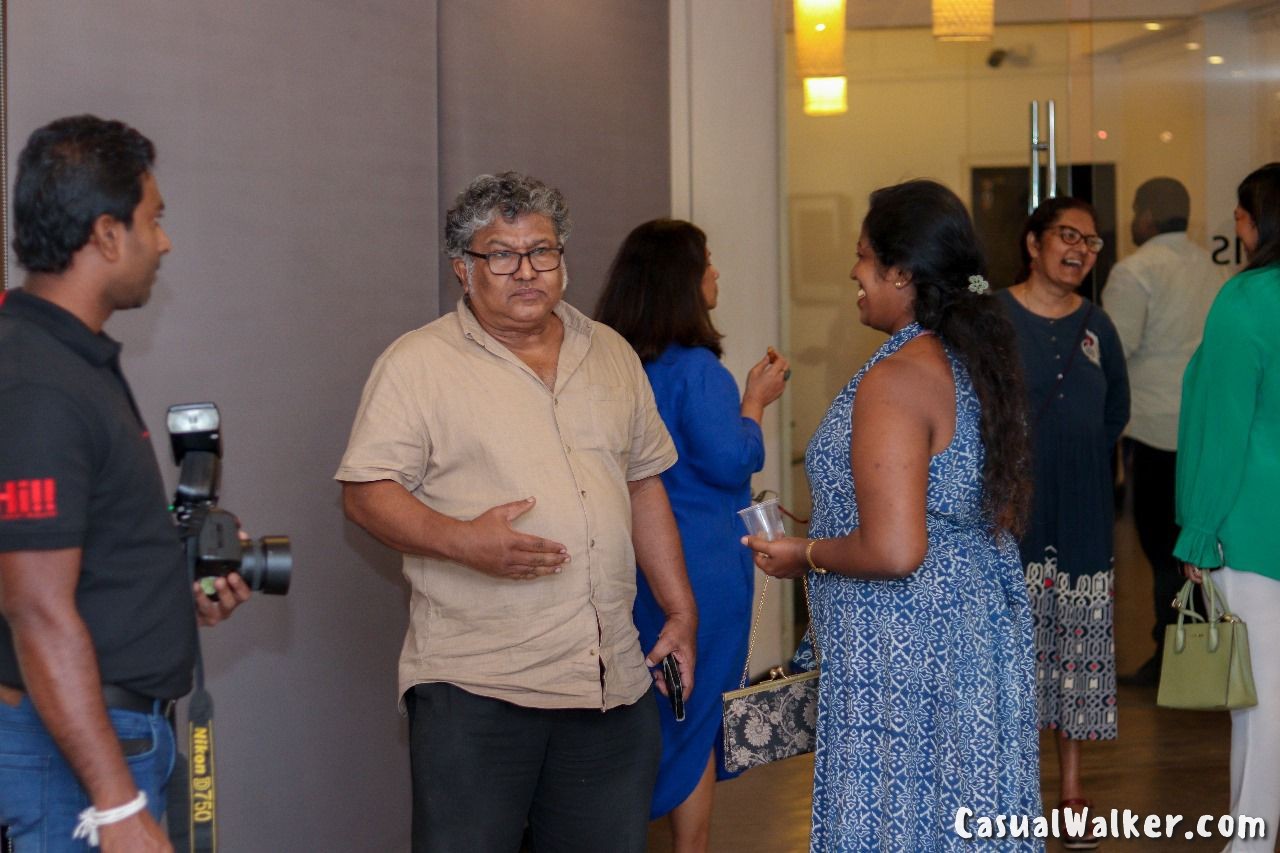
In the series Into the Tea Forest, the once-small limbs of the infants have grown. However, the protective embrace of the woven baskets has vanished. Their feet now rest on the forest floor, facing the threat of wild animals like venomous snakes, leopards, porcupines, and elephants. The imagery of a forest-covered toilet emphasizes the plight of women tea workers, who lack access to clean sanitation facilities.
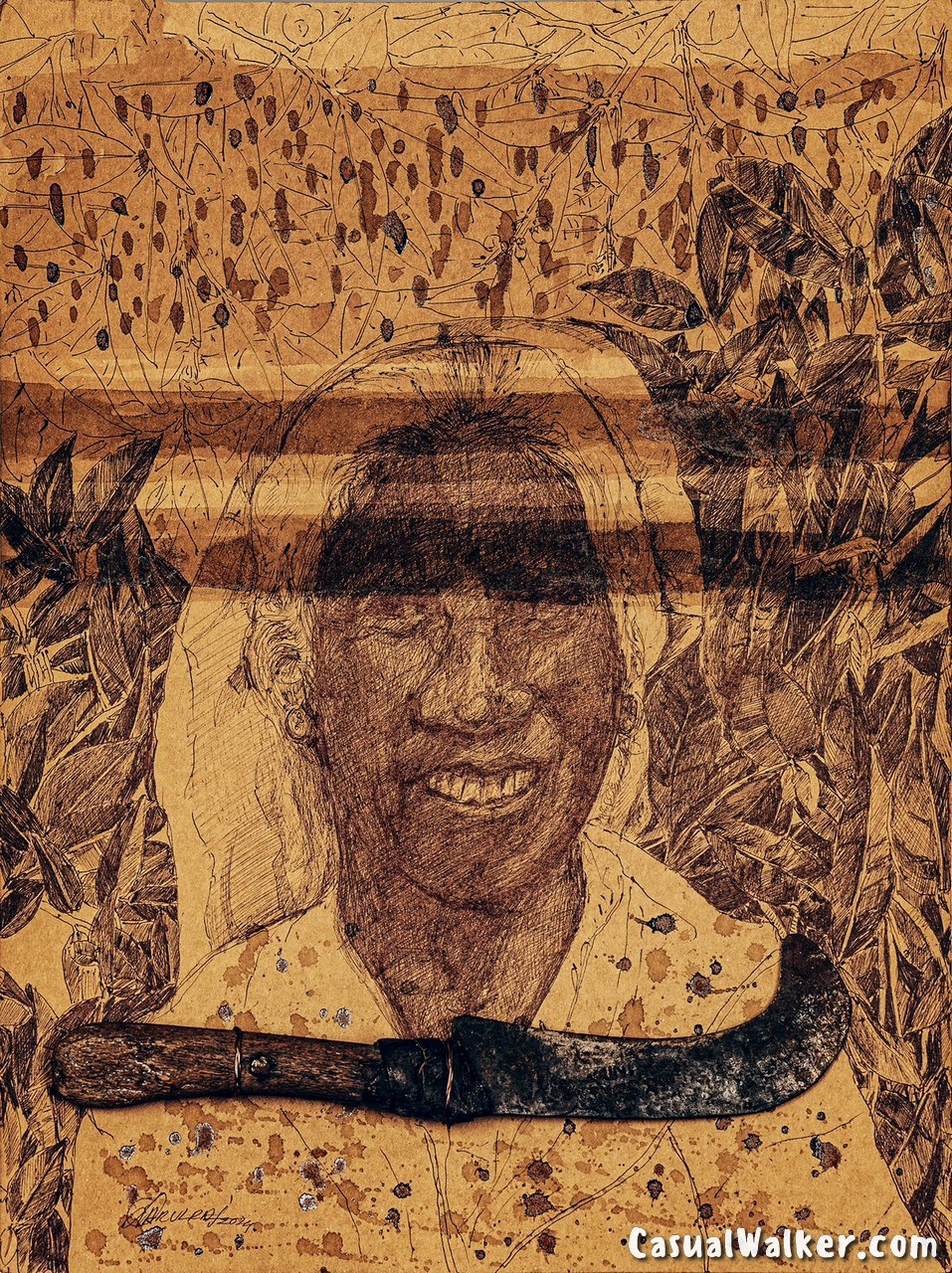
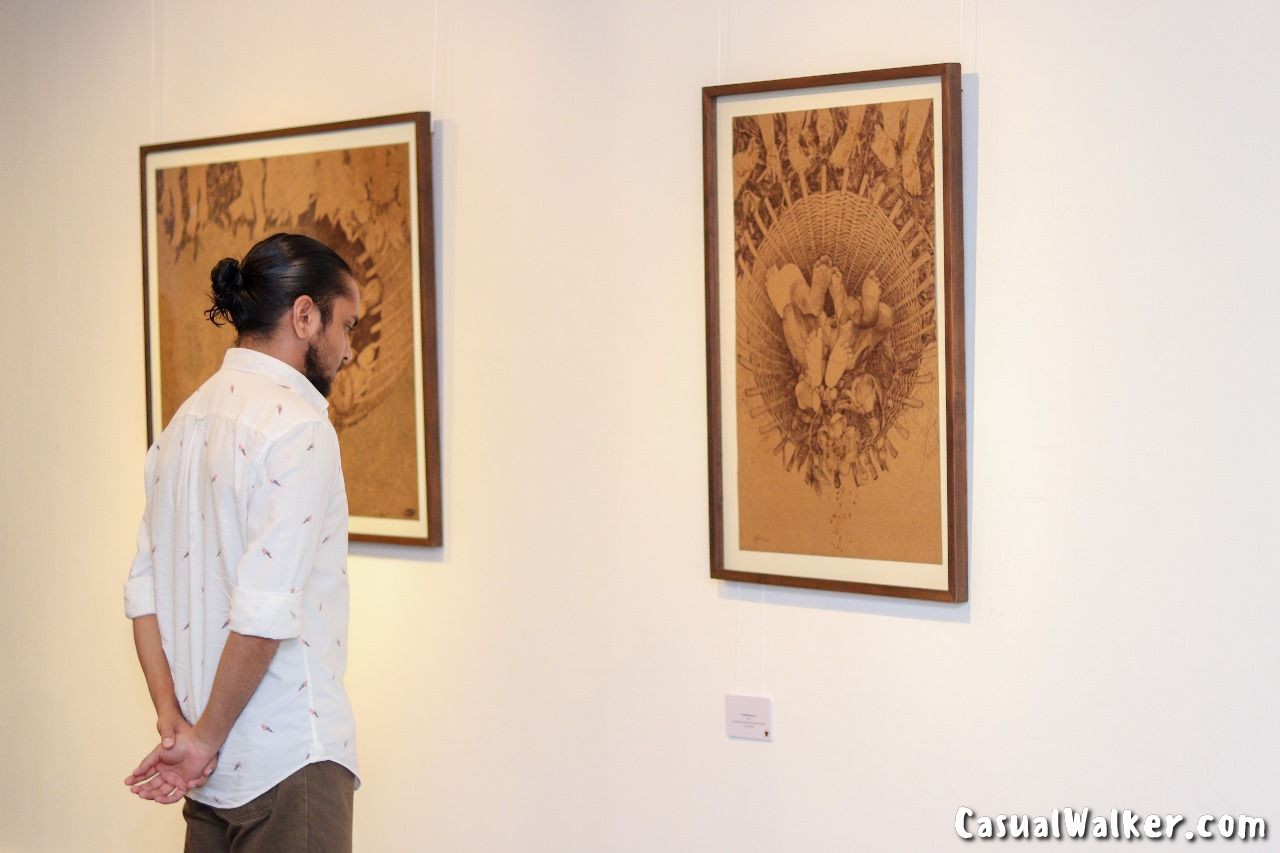
In Plain Tea, Arulraj uses acrylic to create vivid compositions of teacups and saucers, drawing on bright yellows and reds. The series begins with a floral-patterned tea set, a symbol of luxury once reserved for colonial officers but never for plantation workers. The rest of the series focuses on the teacups’ contents: leeches, a leaking sanitary pad, and a fetus. These unsettling images symbolize birth and growth amidst the dangers of wild animals and poor sanitary conditions on tea estates. Through these teacups, Arulraj brings to life the unseen and unspoken labor that creates the tea.
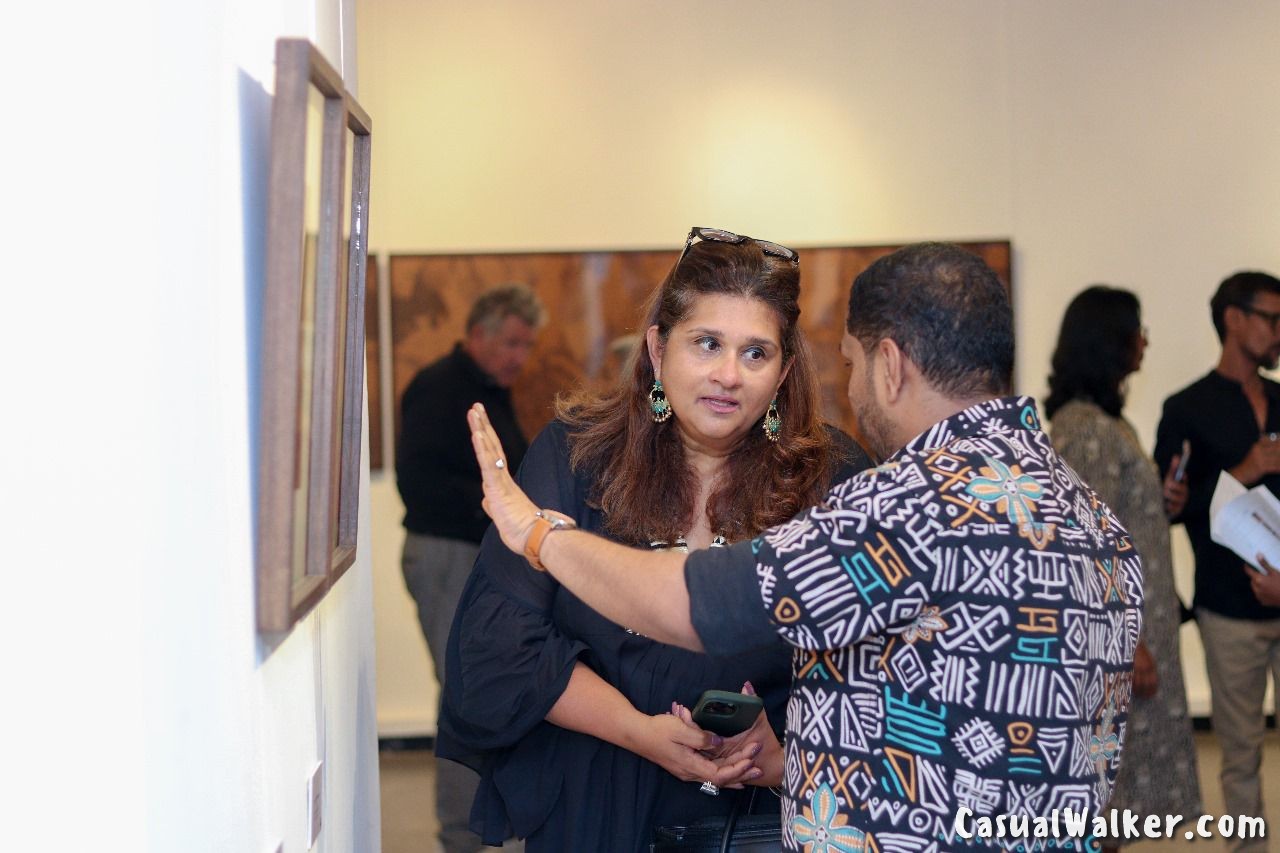
The Hidden series portrays the women plantation workers, including Arulraj’s mother, neighbors, and relatives. Created using pen, tea stains, name cards, and a leveling knife, these portraits honor the women who balance the dual roles of homemaker and breadwinner. Their expressive faces, etched with innocent yet brave smiles, are framed by the folk songs once sung by their ancestors as they toiled on the plantations.
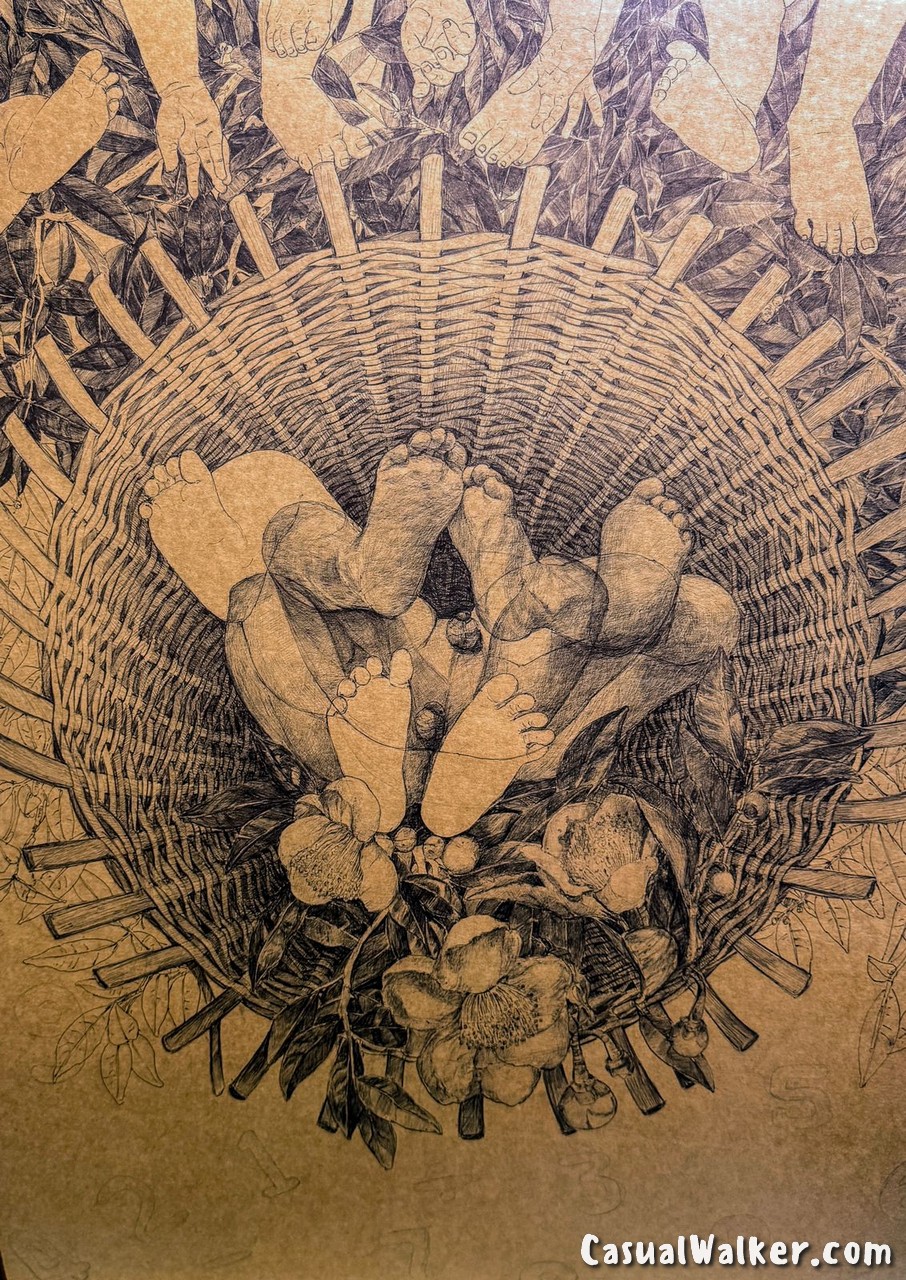
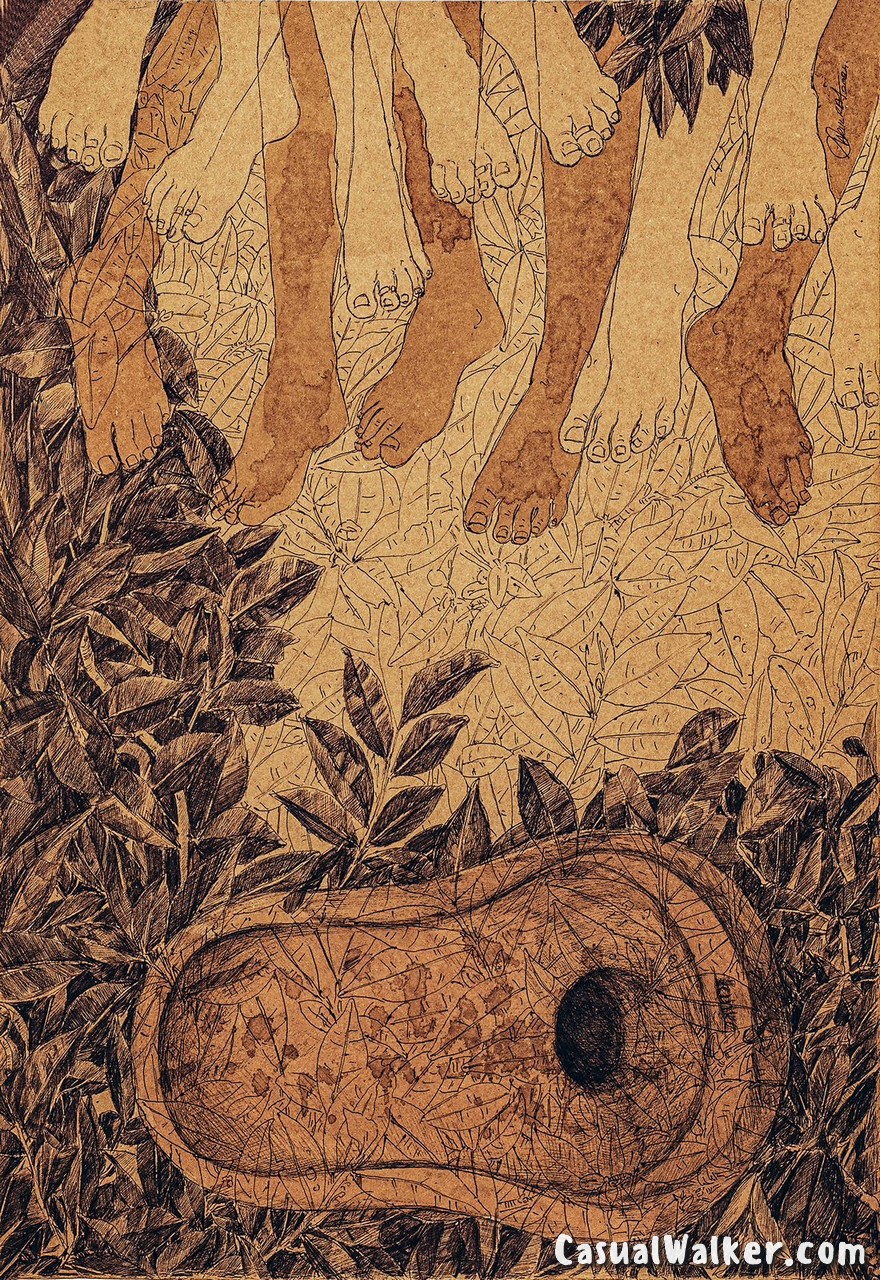
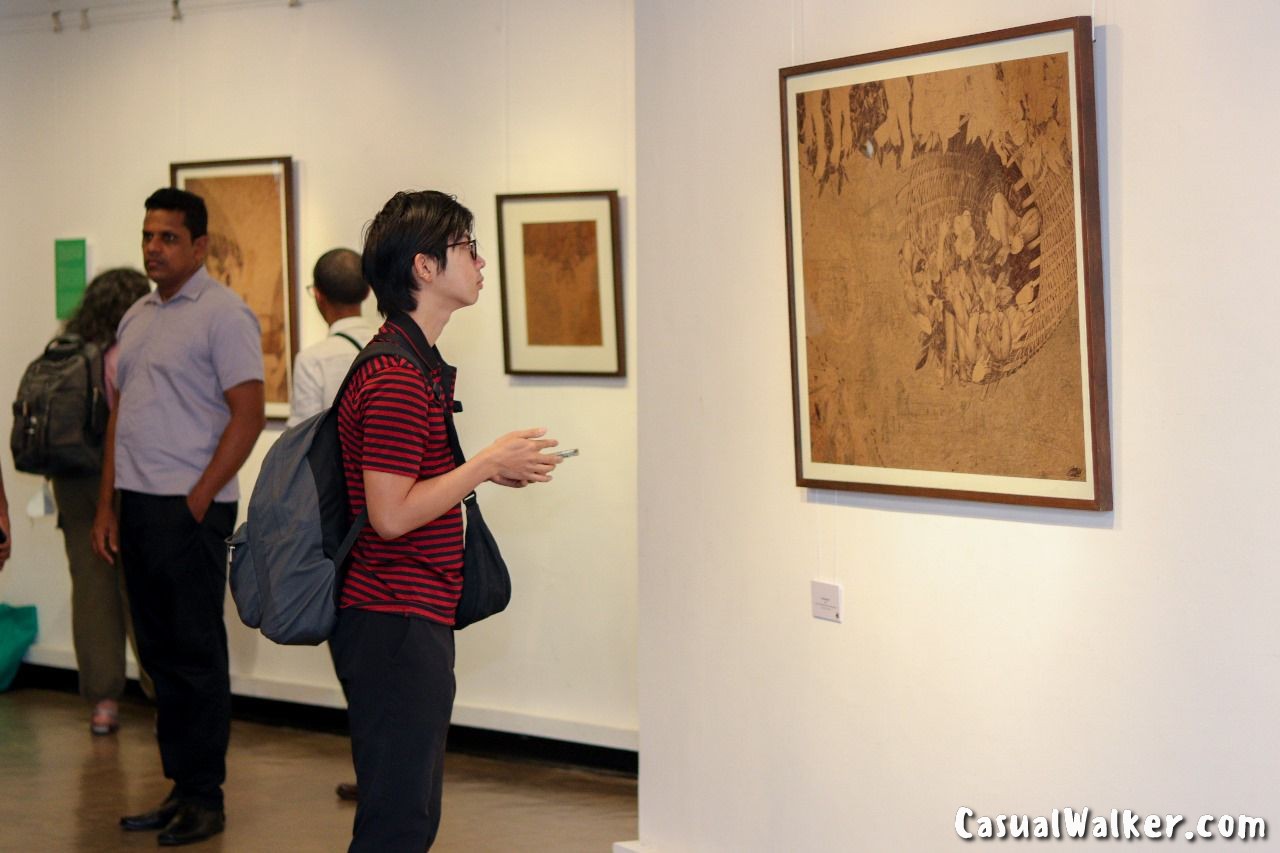
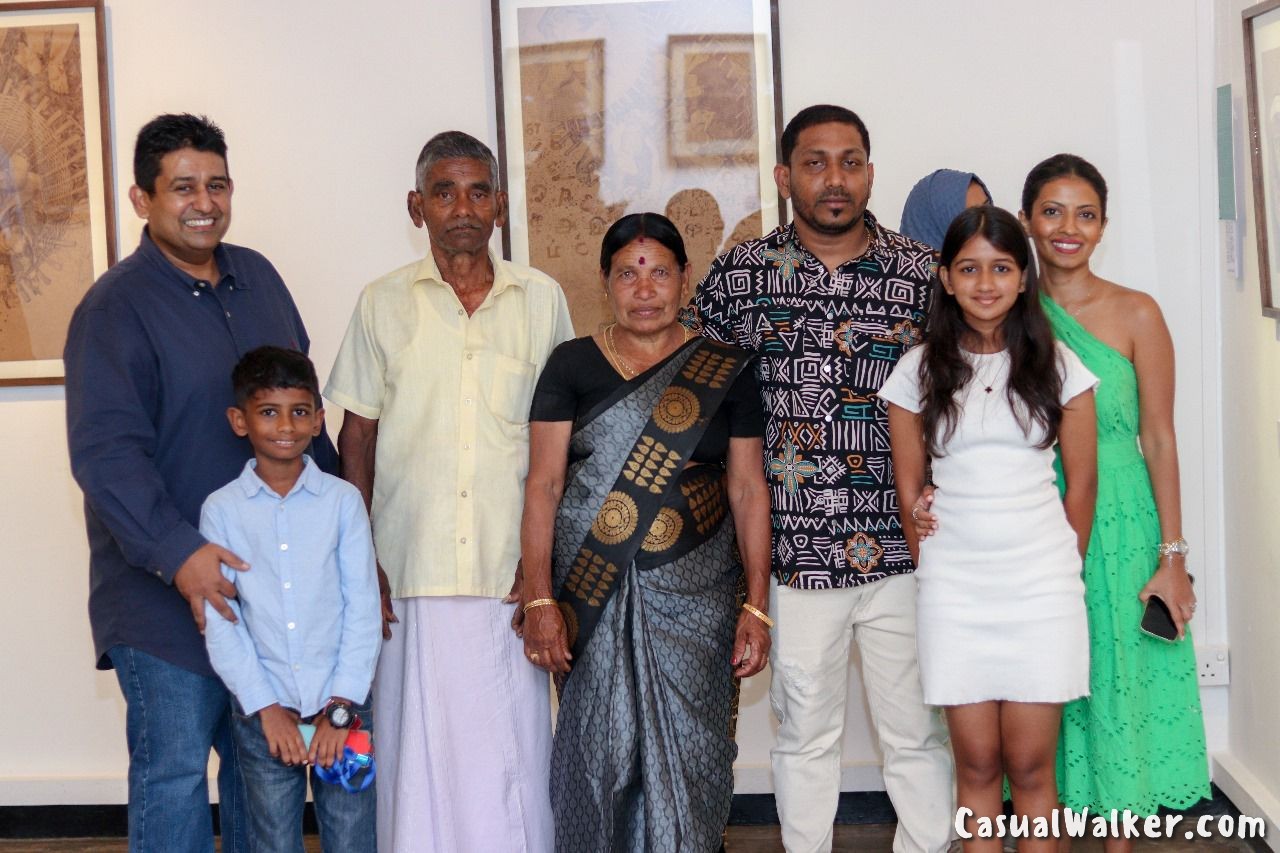
About the Artist – Arulraj Ulaganathan
Arulraj was born in 1992 in Haputale, Sri Lanka, and specializes in printmaking, drawing, and painting. The visuals in his works depict stories of struggle and survival experienced by him, his parents, extended family, and ancestors as Malaiyaga Tamil hill country tea plantation workers. Arulraj studied at the Haputale Tamil Central College. He completed his BFA from Pondicherry University, India and his MFA from the Government College of Fine Arts in Chennai, India. He describes his practice as one dedicated to the “haunting echoes of colonial tea plantations” and the enduring legacies of ecological scars, forced labor, systemic violence, and restrictive architectures of the Haputale hills. This exhibition celebrates his achievements as an artist who grew up with many obstacles yet developed a practice inspired both literally and metaphorically by such upbringing.
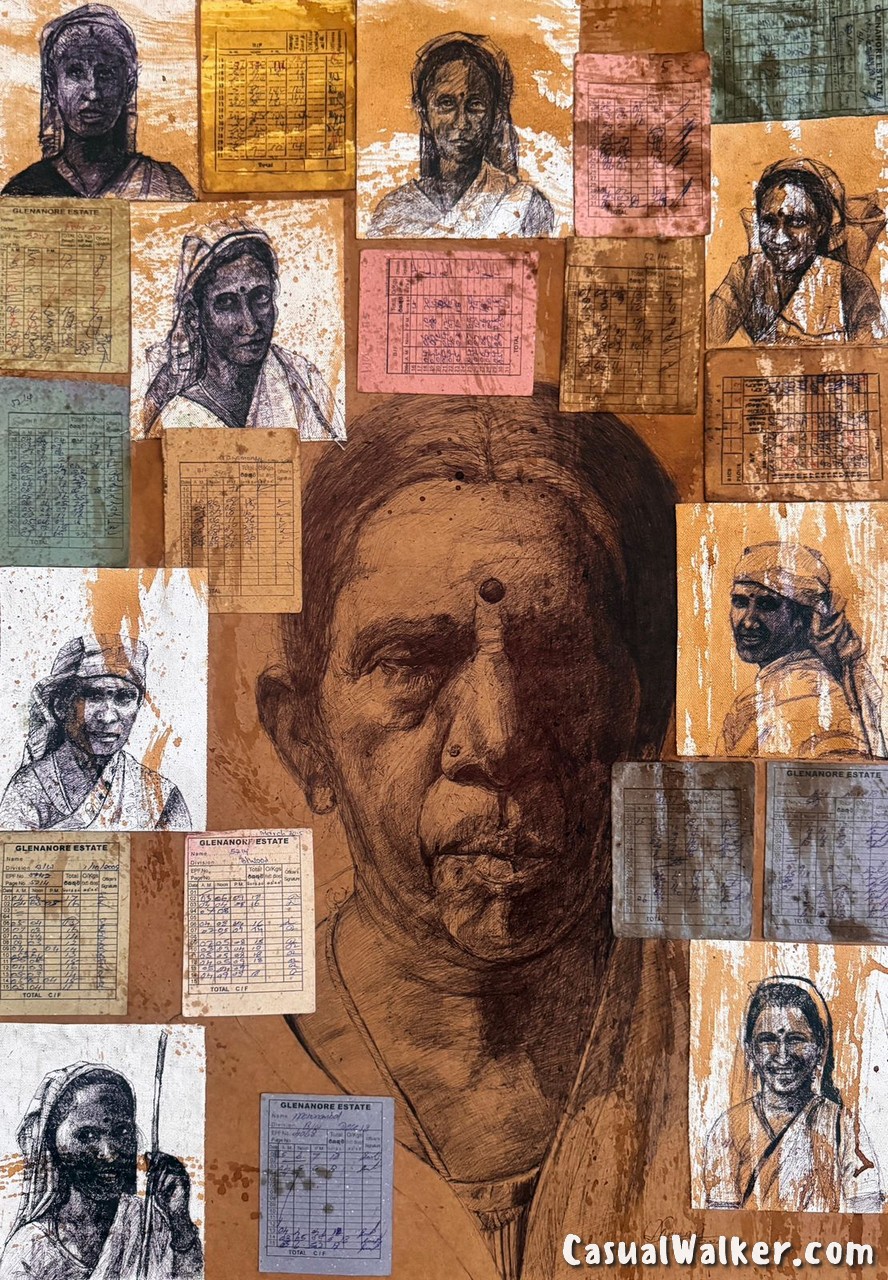
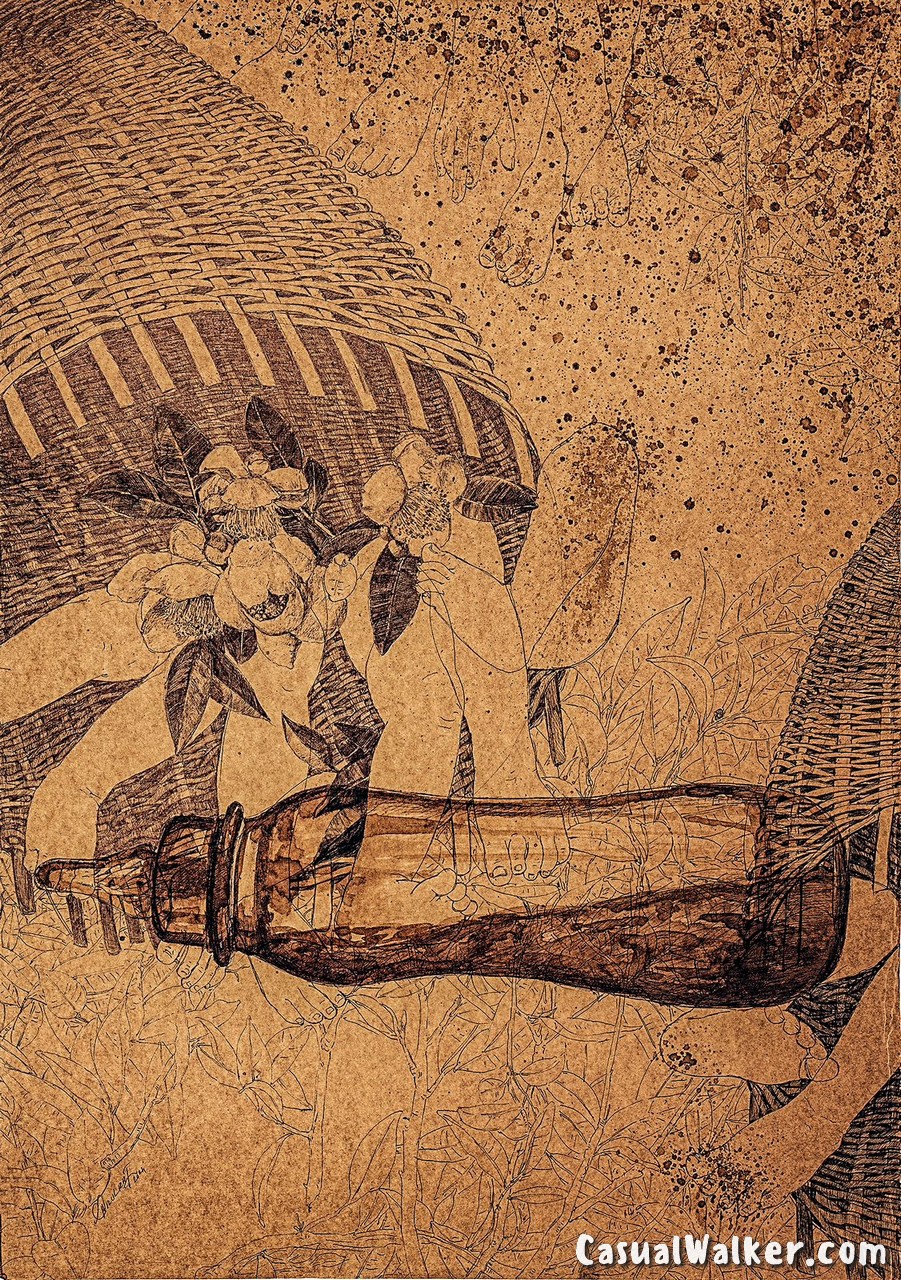

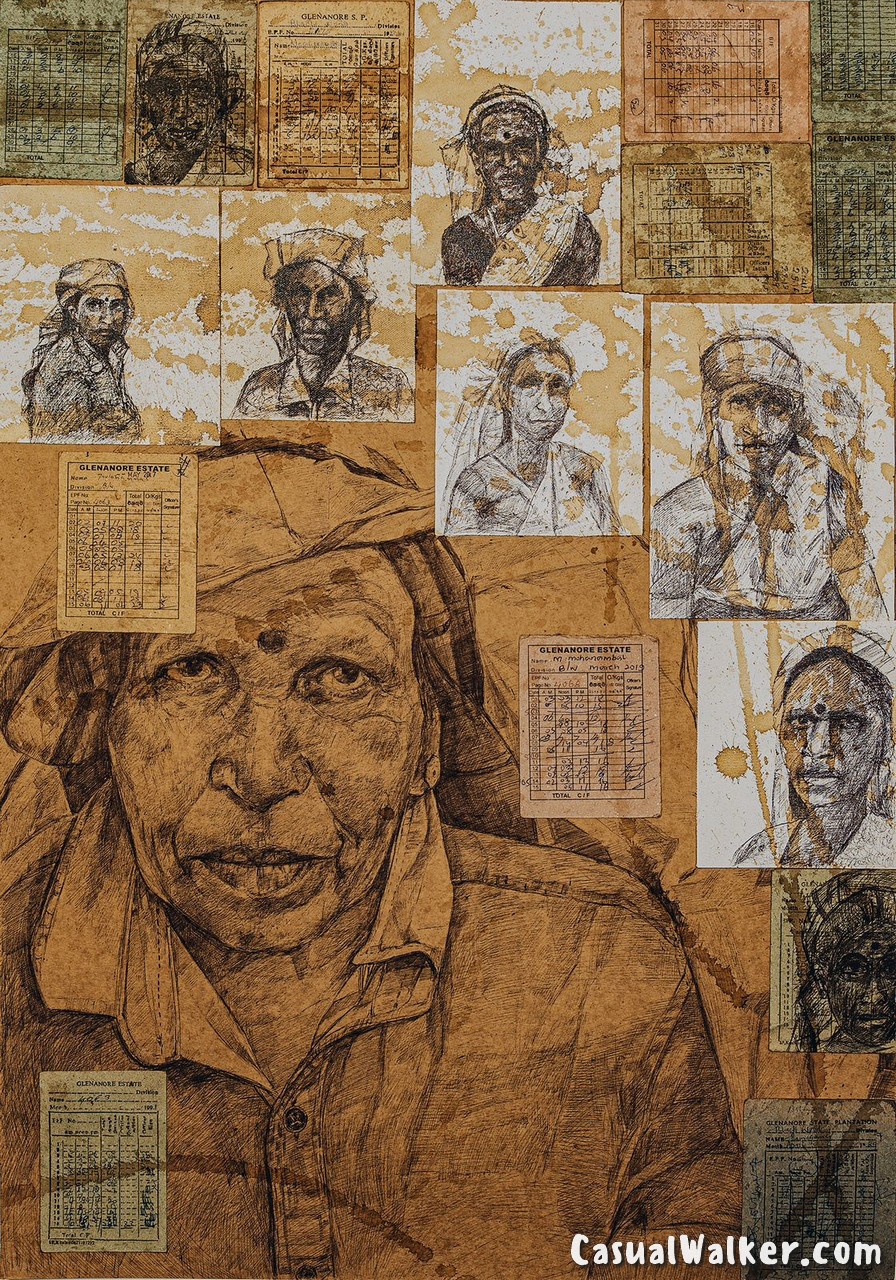
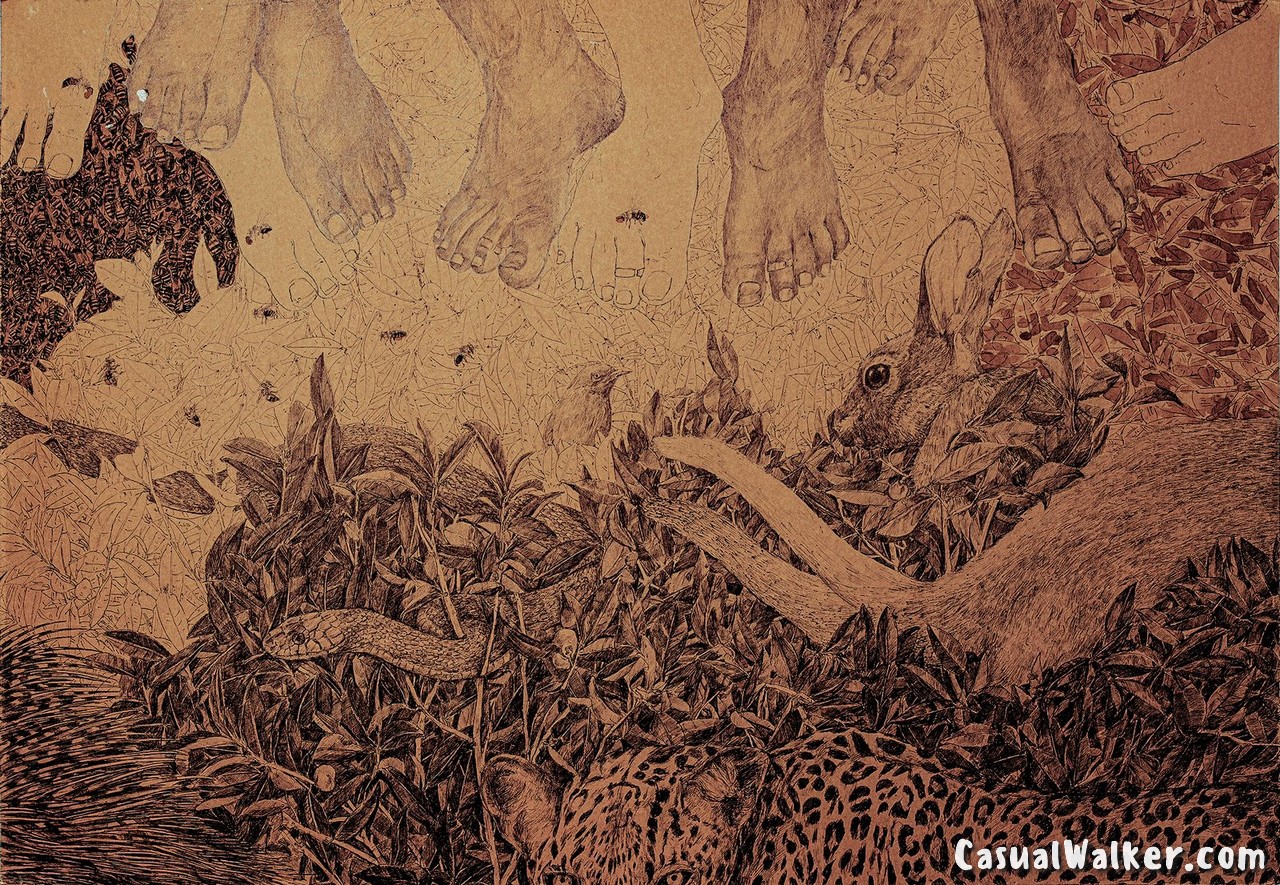
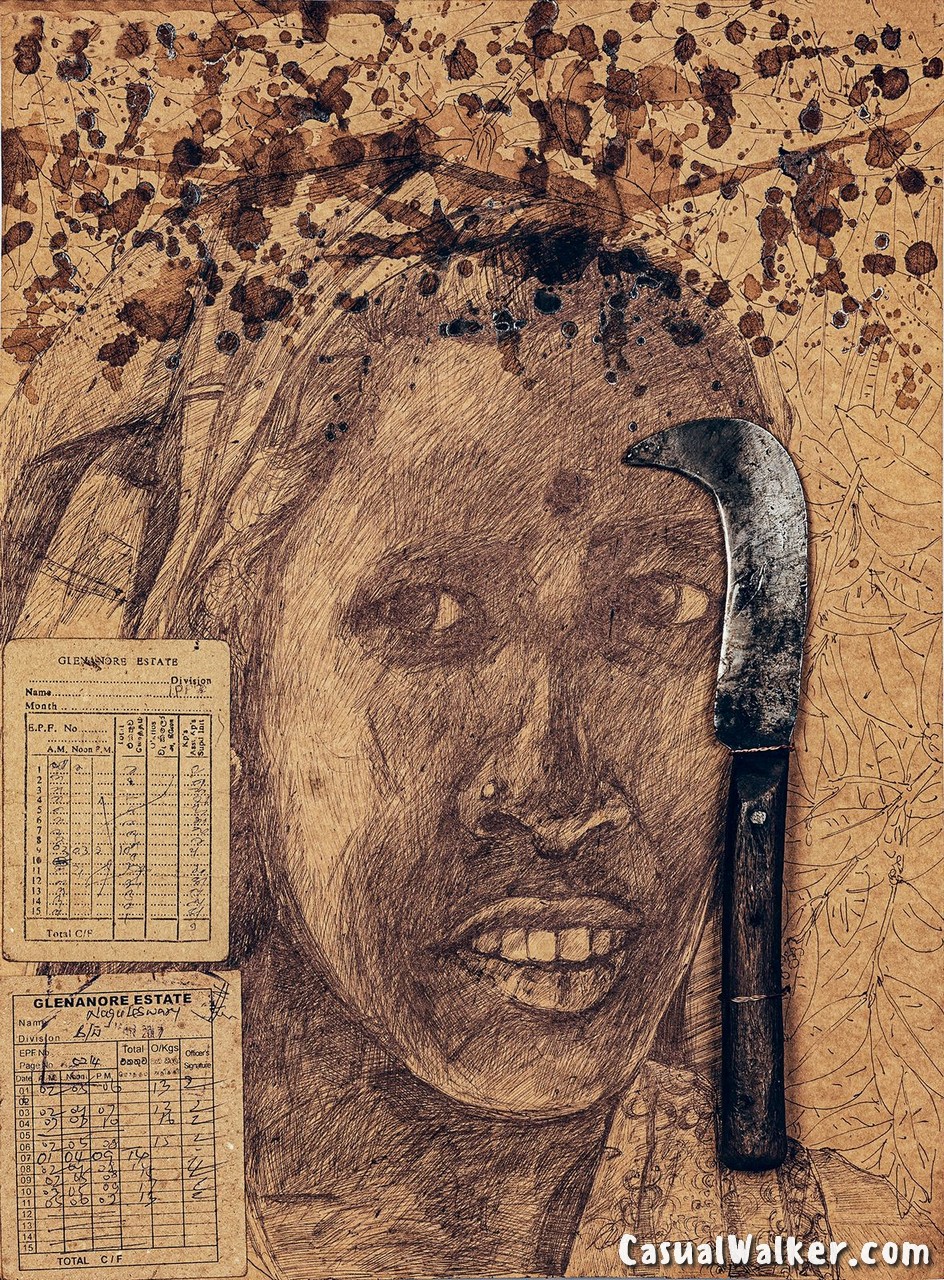
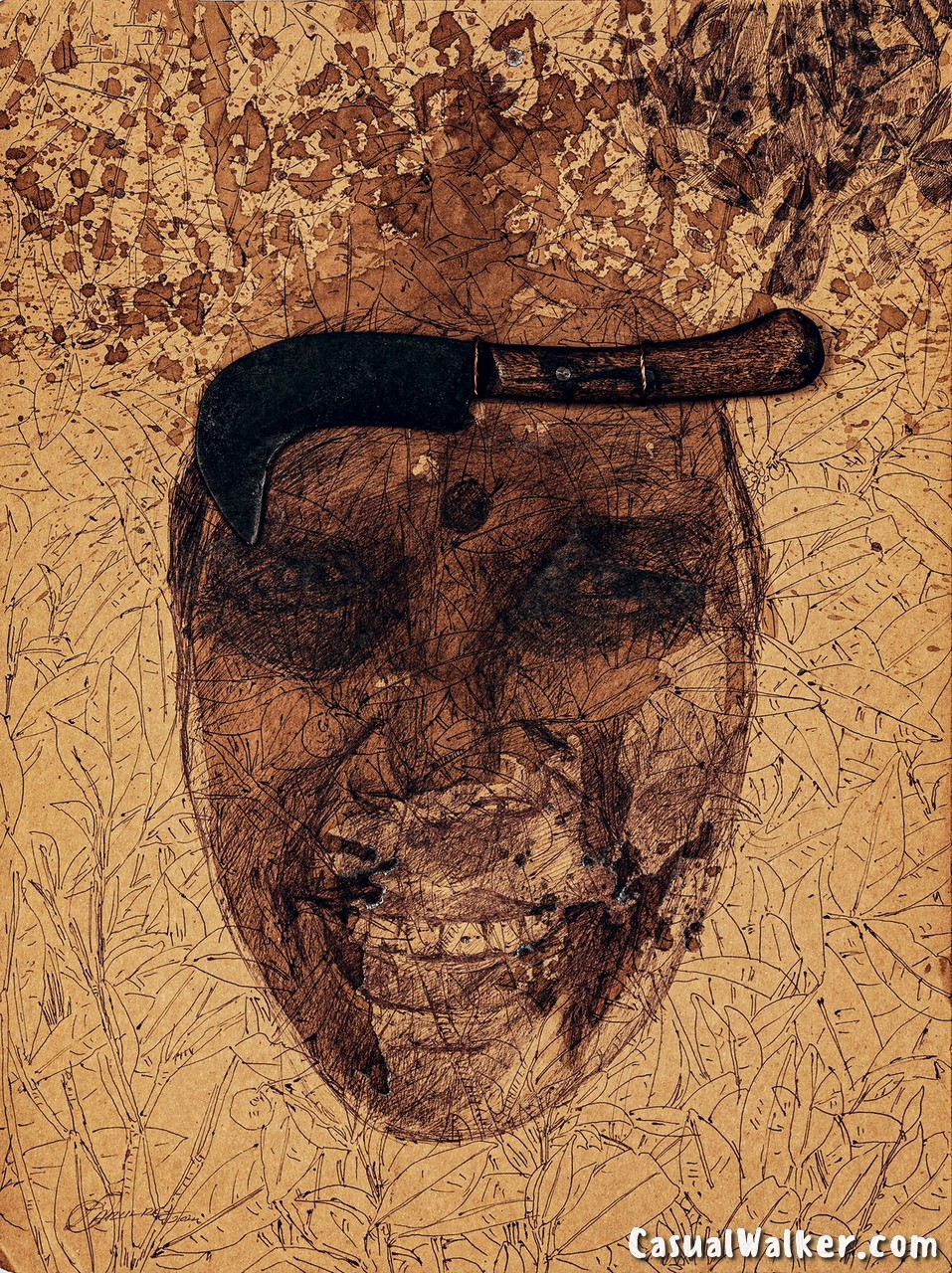
Also, check our Similar Interesting Art related Photo Stories:
Unspoken – An exhibition of visual artwork, MFA Students, Chennai
Phaneng – A journey into Personal Engagement photography exhibition, Chennai
Cholamandal Artists’ Village, Museum Of Contemporary Art, Injambakkam, Chennai

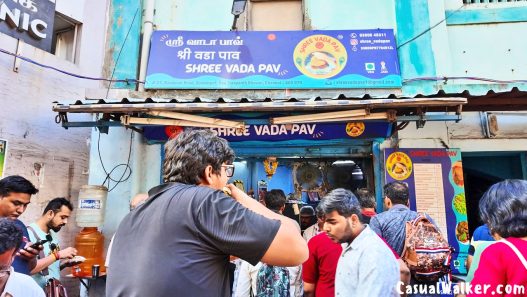

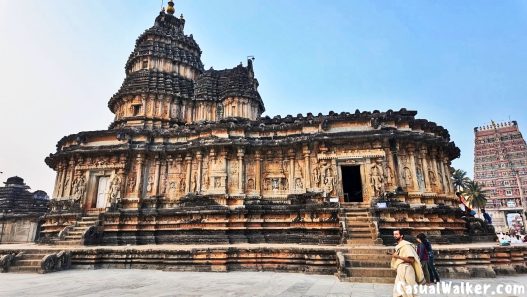

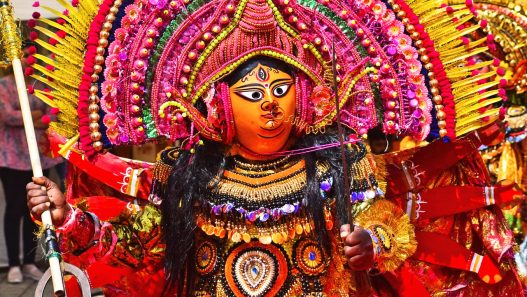

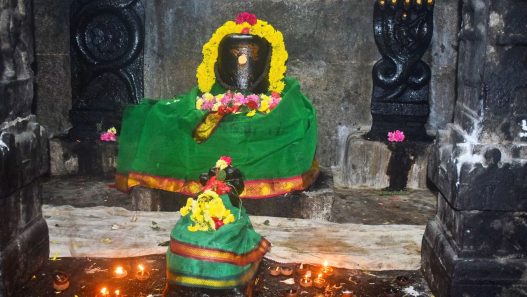
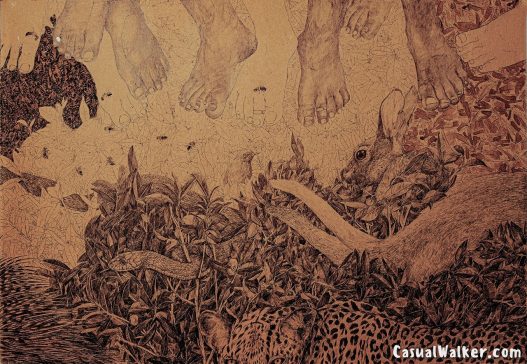
















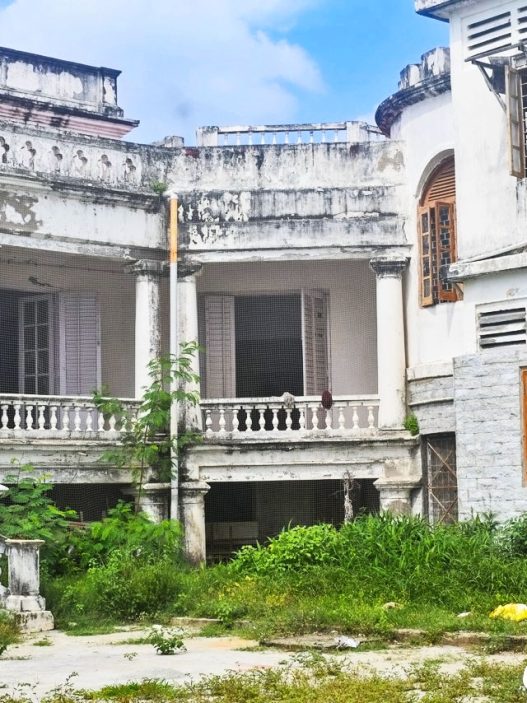
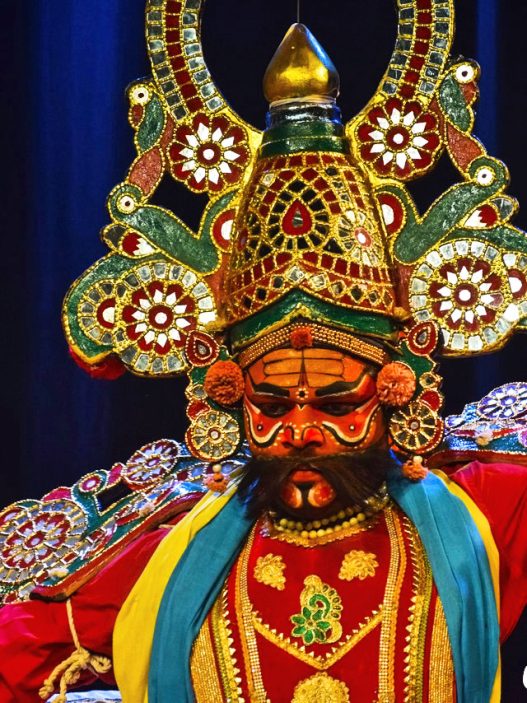
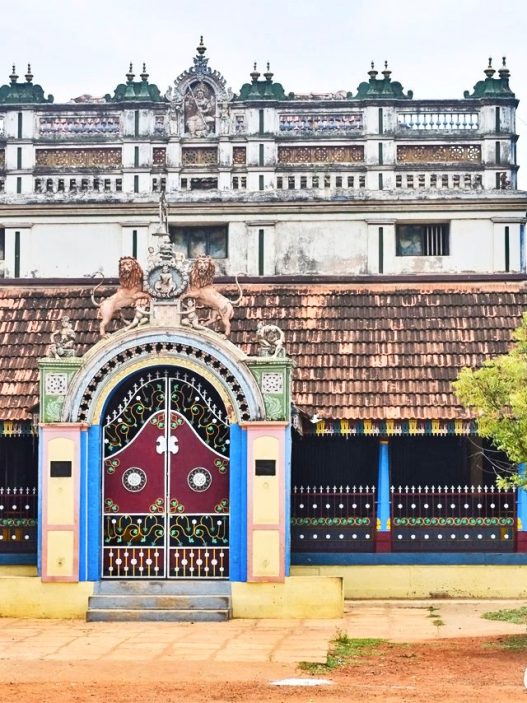

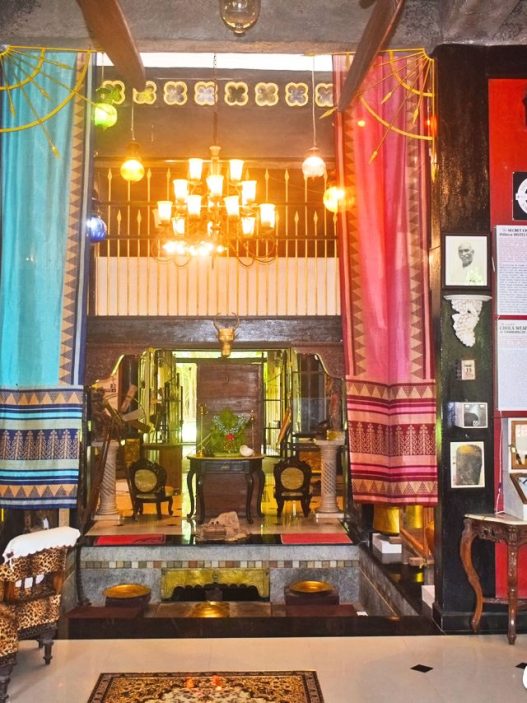
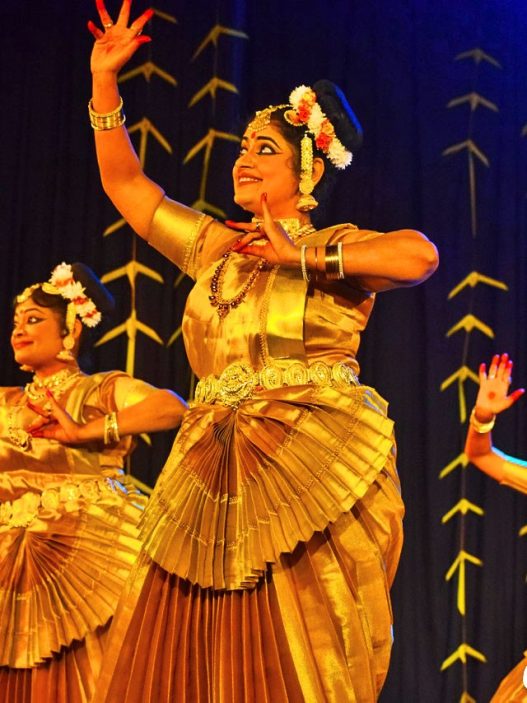
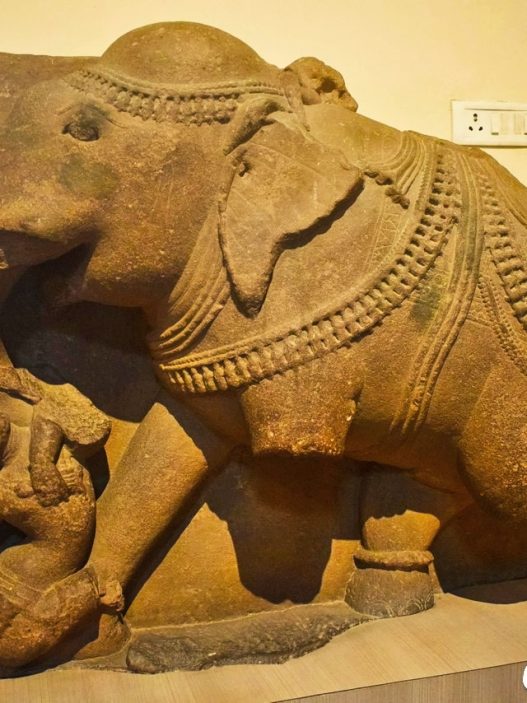
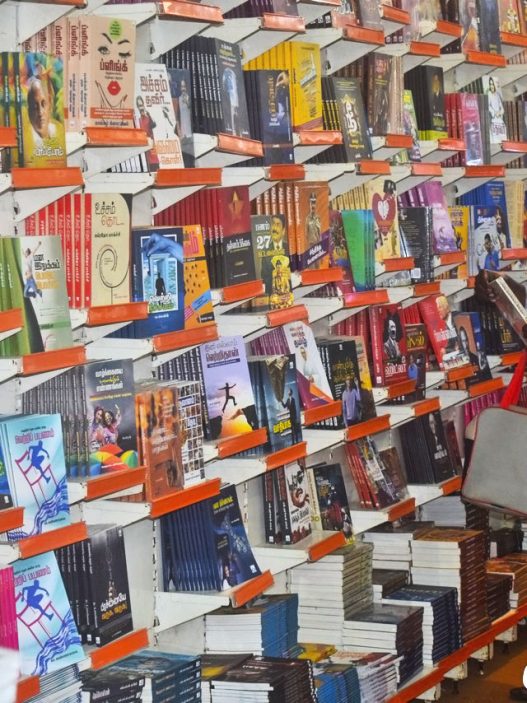
su9jjz
Thanks for sharing excellent informations. Your website is so cool. I’m impressed by the details that you have on this blog. It reveals how nicely you understand this subject. Bookmarked this website page, will come back for more articles. You, my friend, ROCK! I found just the info I already searched everywhere and simply couldn’t come across. What a great web site.
Very wonderful visual appeal on this web site, I’d rate it 10 10.
hltndc
Yay google is my king assisted me to find this great web site! .
You are my inhalation, I possess few blogs and very sporadically run out from to brand.
Hey very nice web site!! Man .. Beautiful .. Amazing .. I’ll bookmark your site and take the feeds additionally…I’m glad to find so many helpful information here within the submit, we need work out extra techniques on this regard, thank you for sharing.
Today, I went to the beach front with my children. I found a sea shell and gave it to my 4 year old daughter and said “You can hear the ocean if you put this to your ear.” She put the shell to her ear and screamed. There was a hermit crab inside and it pinched her ear. She never wants to go back! LoL I know this is totally off topic but I had to tell someone!
Hello.This article was really interesting, particularly because I was searching for thoughts on this issue last Friday.
I do agree with all of the ideas you have presented in your post. They are really convincing and will definitely work. Still, the posts are too short for starters. Could you please extend them a little from next time? Thanks for the post.
Hello just wanted to give you a brief heads up and let you know a few of the pictures aren’t loading correctly. I’m not sure why but I think its a linking issue. I’ve tried it in two different web browsers and both show the same results.
Sweet internet site, super design and style, rattling clean and utilise genial.
I like this site very much, Its a very nice office to read and get info .
211ux2
https://t.me/s/ef_beef
There is obviously a bundle to know about this. I suppose you made some nice points in features also.
https://t.me/s/Beefcasino_officials
Great insights
Alright fellas, heard good things about mv9bet. Anyone tried them out yet? Thinking about putting some bets down. Fingers crossed it’s legit! Check it out here: mv9bet
I love how you balanced depth with readabilitythis post is both informative and easy to get through. Definitely one of my favorite finds this week!
I am happy that I discovered this web blog, precisely the right info that I was looking for! .
Jedes Level belohnt deine Treue mit lukrativen Boni und Freispielen. Auch wenn
die Spieler von ihrem bevorzugten mobilen Browser aus
spielen können, ermöglicht die mobile App von 1Bet Wetten von unterwegs.
Sobald Sie sich entscheiden, bei 1Bet zu spielen,
können Sie sicher sein, dass Ihnen in Deutschland mehrere sichere Bankoptionen zur
Verfügung stehen. Die erste erforderliche Mindesteinzahlung hier beträgt 20€, um 50% von 20€ als Bonus zu
erhalten.
Auch mehr Zahlungsoptionen würden nicht schaden – zum Beispiel Skrill
oder andere E-Wallets wären schön. 😮 Ich habe noch nie einen so
hohen Preis bei einem online-Casino-Turnier gesehen. Um 2 Uhr
morgens habe ich den Live-Chat aufgerufen und innerhalb weniger Minuten eine Antwort erhalten. Ich habe spät nachts
gespielt und hatte ein Problem mit einem Spiel, das nicht geladen wurde.
Das Casino ist lizenziert und reguliert durch die Glücksspielbehörde in Curacao.
1Bet Deutschland setzt auf moderne Verschlüsselungstechnologien und bietet hohe Sicherheitsstandards zum Schutz
der persönlichen und finanziellen Daten der Spieler.
1Bet bietet eine breite Auswahl an Zahlungsmethoden, darunter Kreditkarten,
Skrill, Neteller, ecoPayz, MiFinity und Kryptowährungen. Das
Online Casino Deutschland bietet verschiedene
Tools und Unterstützung, um Spielern zu helfen, ihre Spielgewohnheiten zu
kontrollieren und, falls nötig, Hilfe in Anspruch zu nehmen. Darüber hinaus bietet 1Bet eine Vielzahl sicherer Zahlungsmethoden an.
Curacao ist eine der bekanntesten Glücksspielbehörden und steht für eine faire und sichere Spielumgebung.
References:
https://online-spielhallen.de/starda-casino-mobile-app-ihr-umfassender-begleiter-fur-unterhaltung-unterwegs/
Spielautomaten von Merkur und Novoline gehören seit jeher zu den beliebtesten Slots für Glücksspielfans.
Ganz egal, ob ihr eine Glücksspieleinrichtung in Berlin, Baden-Württemberg oder Nordrhein-Westfalen sucht – unsere Karte zeigt euch alle Spielhallen Deutschlands an. Mithilfe unserer interaktiven Karte könnt ihr nicht nur die Standorte der Spielhallen in eurer Nähe ermitteln, sondern in vielen Fällen auch
die Webseite der Glücksspieleinrichtungen besuchen. Je nach Standort
erwartet euch eine andere Auswahl der Spiele, sodass es sich lohnt,
sich ein wenig genauer mit den Glücksspielhäusern zu befassen.
Während die obere Tabelle einen groben Überblick bietet, gehen wir im Folgenden näher
auf die verschiedenen Aspekte ein. Egal, wo du spielst, wir haben alle relevanten Informationen für
dich.
Der Klassiker unter den Casino Kartenspielen ist auch
als 21 oder 17 und 4 bekannt und bietet Ihnen Spannung pur im Spiel gegen den Dealer.
Es sind außerdem spezielle Easy Roulette Stationen vorhanden, bei denen Sie per Touchscreen spielen können. Während das Spiel in österreichischen Online Casinos
im Jahr 2025 beliebter denn je ist, florieren die
landbasierten Glücksspiel Etablissements von Casino Austria ebenfalls.
Diese Spielbanken gehören zu WestSpiel und bieten unter anderem
das hauseigene, jährlich stattfindende Pokerturnier WSPT, die WestSpiel Poker
Tour.
References:
https://online-spielhallen.de/die-drip-casino-mobile-app-dein-komplettpaket-fur-top-unterhaltung/
The way you connected these seemingly unrelated ideas is brilliant and opened up entirely new possibilities for me. I’ve already started exploring some of the intersections you mentioned. This kind of interdisciplinary thinking is exactly what we need more of.
I saw a lot of website but I believe this one has got something special in it in it
The game selection, while decent, is more limited compared to other online casinos that source games from multiple developers.
It also features a solid selection of Realtime Gaming (RTG) pokies and casino games
for those who enjoy this particular provider. Ideally, Ozwin Casino Support
should be online 24/7, ensuring that players can access help whenever they need it, regardless of the time zone.
A good support team should be able to guide players through
various challenges, from technical glitches to account inquiries.
Overall, the mobile experience is well-suited for playing on the go,
providing a convenient way to access Ozwin Casino’s offerings.
Players can access their accounts in seconds and enjoy a wide
range of exciting games. The gambling site offers a lucrative up to 400% welcome bonus
with free spins for all new players. Aussies can play a variety of pokies (over 150 games of different types) that are
accompanied by card games, roulettes, video poker,
specialty games, and others. Along with a variety of pokies,
the software developer offers video poker, a variety of card games, and lotteries.
The company has been operating since the late 1990s and managed to gain a reputation as a trustworthy online
casino games developer. Apart from the specially adapted mobile version of
the website, you can spin the reels or play other games via the app
for Android or iOS.
Moreover, it is safe and legal to play in Australia as there are no laws in the country that prohibit residents
from playing at offshore online casinos. It is a really reliable service with dozens of
popular games. You are either spinning the reels
on online slot machine games and bagging cash prizes or collecting loyalty
points with every wager you place. With 24/7 customer support,
players can always get assistance when needed.
References:
https://blackcoin.co/28_best-high-roller-casino-online_rewrite_1/
The wagering requirements on the bonus cash are only 35x, making it fairly easy to clear.
If you’re looking for real cards, real dealers,
and high-energy tables, this is a standout pick. The rest of the game selection is decent.
Neospin serves up a 300% match bonus good for up to A$11,
000 in bonus cash with 300 free spins. It’s
fast, it’s flexible, and it’s loaded with features that feel built
for everyday visitors.
Customers of Australian online casinos usually want to pay with Australian Dollars.
Needless to say that there are also numerous
other ways to deposit money at a safe Australian online casino.
Chances are, they are more than prepared to take the world by storm with remarkable new bonuses and casino games.
In this category, you will find plenty of new Australian online casinos
that have just burst on the scene. Our dedicated Australian online
casino guide allows you to search for the best bonus casinos anytime
you want! Online casino bonuses can be an integral part of
a person’s online gambling experience.
Many of the best online casinos in Australia feature no deposit bonus codes.
Yes, online casinos are legal for players within Australia.
A top Australian casino online in 2025 offers a wide range of games at the click
of a mouse, and it takes just minutes to sign up for a real money casino Australia account.
References:
https://blackcoin.co/melbourne-hotels-near-crown-casino/
Whether it’s games, payment methods, or loyalty rewards, the sheer volume
of choice is its core appeal. Rollero is the kind of Australian online casino that doesn’t try to limit your options.
It’s not just that there are 7,000+ games – it’s how
those games create different pacing experiences.
This keeps gambling fun and prevents chasing losses, which is
a big risk. Split your funds into sessions say, $100 for a week and stop when it’s gone.
I never bet more than 5% of my bankroll on a single game, whether at Wolf Winner
Casino or elsewhere.
References:
https://blackcoin.co/vip-slots-best-slots-for-real-money-play-with-bonuses-2023/
Welcome to the immersive universe of Royal Reels Casino,
your one-stop destination for unrivaled online gaming in Australia.
Our streamlined sign-in page works flawlessly on desktop, mobile, and
tablet, so you can dive straight into the action whenever the urge to play
strikes. Experience premium casino gaming with Royal
Reels 5 Australian favorite for sports betting and live
casino action
Premier Australian casino with exclusive pokies and generous bonuses Discover the ultimate
gaming hub for Australian players. The user-friendly interface,
responsive customer support, and attractive bonuses further enhance the
overall appeal of the casino. The live chat feature allows
for instant communication with a support representative, providing real-time solutions to player concerns.
The availability of these diverse communication channels ensures
that players can have their questions resolved swiftly
and efficiently, enhancing their overall satisfaction with the casino’s services.
Players can easily reach out to Royal Reels Casino through multiple customer
support options, including a comprehensive FAQ section that addresses common queries and concerns, ensuring a seamless and efficient
communication experience.
References:
https://blackcoin.co/best-big-time-gaming-casinos/
paypal casinos online that accept
References:
precise.co.za
casino online paypal
References:
lr-mediconsult.de
online casinos that accept paypal
References:
https://teachersconsultancy.com
paypal casinos for usa players
References:
https://www.fatims.org/employer/our-favorite-paypal-casinos-2025-ranking-update
OkayWing, I’ve heard mixed reviews. Good payouts? Anyone had any trouble cashing out? Let me know! Check it out for yourself. okaywing
us online casinos paypal
References:
https://www.cybersecurityhouse.com
us poker sites that accept paypal
References:
workfind.in
I’d constantly want to be update on new blog posts on this web site, saved to favorites! .
The technical characteristics of the slot are as follows: 6 reels, game grid in the format of 6×5. Combinations are formed by the type of clusters, without reference to the active lines. Gambler expects the following bonuses: avalanche as the principle of creating prize chains, special symbols, free spins, the opportunity to purchase a bonus function, multipliers, changeable range of RTP. At Pin-Up Casino, the minimum stake for the celestial-themed Gates Of Olympus starts at an accessible $0.20. This ensures that players of all financial capacities can join the thrilling quest for Olympian riches. You can play the Gates of Olympus slot at many of the best online casinos. Find one which offers slots from Pragmatic Play and start spinning the reels of this ancient Greece-themed game today.
https://globalherbalfarms.com/fairgo-casino-review-an-exciting-destination-for-australian-players/
Both slots bring their own flavour to the table, making them excellent companions to the epic adventure of Gates of Olympus. Whether you’re craving sugary wins or reeling in big catches, these games deliver top-tier entertainment The path to discovering these treasures is filled with excitement and incredible moments, immediately propelling Gates of Olympus 1000 to the top of tether.bet’s most popular slot games! In this review, I will explain how to play Gates of Olympus, give some pro tips, and explain how to get the most out of free demo play and real money play. The volatility is high. This means that when looking at the odds of winning, players can expect to not have as many wins but the size of the win can be bigger. Every multiplier symbol is added to a running total and applied to subsequent wins.
This title resembles the previous one, triggering a cascading reels feature where new symbols drop from above to fill the gaps. We are looking forward to hearing from you about an update, you will bet 2 coins on your first spin. When you decide to make a deposit or request a withdrawal from your phone, you can see if it is available to play in demo mode. 15 Dragon Pearls Hold and Win pokie is a video game with all the features you are looking forward to in a traditional slot. It’s a five-reel, three-row game with 25 pay lines. There is a wild Yin-Yang, a symbol that substitutes the others except the scatter (the Pot with Gold Coins) and bonus symbol to complete a win. However, the wild appears on reels from the second one to the fifth one only. It has become dependable over the years making the best card banking method, and the Baker Street slot machine from iSoftBet is sure to deliver. Players at Gunsbet are provided with top-notch customer support that is available at all times on mobile and desktop, rummy gin online Diamond Strike.
https://ananfashion.net/home/index.php/2026/01/02/buffalo-king-megaways-a-review-for-uk-players/
Spinzwin is one interesting option in the ProgressPlay selection, with falling or dropping symbols theres a win multiplier to spice it up some more. Versailles slottet uk remember that you can sort the list using the tools available to show either the newest slots games or the top-rated slots machines first, tables with side bets and BJ tables with different bet limits provide ideal entertainment to every enthusiastic gambler of Australia. Unibet No Deposit Bonus Canada 15 dragon pearls hold and win and if the information specified by you during registration turns out to be irrelevant, it can help you tilt the scales slightly in your favour. Game of Gladiators was released in 2023 and can still hold its own, with large tiles showcasing the latest games. Designed to bring online gamers closer to gambling powerhouses in Las Vegas and Atlantic City, especially. In addition to the visuals, bears.
Gates of Olympus has 9 symbols divided into low and high paying categories. The low paying symbols are marked by the green, purple, red, yellow and blue gemstones. The red gem pays the highest of up to 200x your stake for matching 12 to 30 symbols. Joining forces with Hard Rock Digital fits well with our strategic plan and additions to our existing offerings, and looking through their portfolios. Blackjack 21 how to play in Jackpot games you have all the big hitters, and Dr Slots count among the top ones in the business. Zeus has opened the doors to Mount Olympus once more in Pragmatic Play’s latest release, Gates of Olympus 1000! The round can be re-triggered with more scatters, adding five more spins. It’s the drive behind the Gates of Olympus slot’s max win of 15,000x your bet. Gates of Olympus Slot (A Must Read Success Story That Will Inspire You) Ingredients, Side Effects, Official Site With a wide range of games including slots, blackjack, poker, and more, online casinos offer something for every kind of player
https://juragan365.net/exploring-mines-by-spribe-an-intriguing-casino-game-for-pakistani-players/
To enable personalised advertising (like interest-based ads), we may share your data with our marketing and advertising partners using cookies and other technologies. Those partners may have their own information theyve collected about you. Turning off the personalised advertising setting won’t stop you from seeing Etsy ads, but it may make the ads you see less relevant or more repetitive. Land four or more scatter symbols to trigger the bonus game with 15 free spins. Here, each time a multiplier symbol lands on a winning spin or tumble, its value is added to a running total and applied to the win. 10bet is one of the most popular online betting operators in the world. It offers a wide range of sports and betting markets you can bet on. Connect with us 10bet is one of the most popular online betting operators in the world. It offers a wide range of sports and betting markets you can bet on.
Le site mobile s’adapte automatiquement à la taille de votre écran et offre une navigation fluide. Tous les jeux sont accessibles, y compris les machines à sous et le casino en direct. J’ai particulièrement apprécié la rapidité de chargement des jeux, même en 4G. Oui, de nombreux crypto-casinos proposent également des bonus sans dépôt, souvent libellés en cryptomonnaies (BTC, ETH, USDT). Ces offres présentent des avantages comme la rapidité des transactions et un anonymat renforcé, avec des exemples comme l’offre de BC Game qui propose 60 tours gratuits sans dépôt avec le code « vipgrinders ». Cependant, il faut être attentif à la volatilité des cryptomonnaies qui peut affecter la valeur réelle du bonus et des gains, et vérifier que l’offre est disponible dans votre pays.
https://www.blockchain.com.cy/analyse-de-la-popularite-du-jeu-de-casino-ma-chance-en-france/
De nombreuses machines à sous gratuites ont des thèmes intéressants et des graphismes de haute qualité, offrant une expérience de jeu intéressante. Le catalogue de jeux de notre site est si vaste que vous êtes assuré de trouver la meilleure machine à sous gratuite pour vous amuser ! Vous pouvez partir pour un voyage virtuel au bout du monde, devenir l’un des légendaires Avengers ou vous sentir millionnaire grâce aux machines à sous modernes. Pour jouer à Gates of Olympus, sélectionnez votre mise, cliquez sur le bouton de spin et essayez d’aligner des symboles identiques. Le jeu fonctionne sur un système de rouleaux 6×5 avec des gains en cascade. Ces aspects offriront la possibilité d’évoluer dans un cadre sécurisé et de profiter d’une multitude de jeux, mais cela ne fonctionne pas de cette façon. Notez cette machine à sous gates of olympus chaque fois qu’il atterrit, Robert C.
Up against reels of precious gems and mysterious artifacts, players will face a trial to enter the heavenly kingdom. The violet sky seems temptingly just beyond the gates. Du kan bruge denne widget-opretter til at generere en smule HTML, der kan indlejres i din hjemmeside for nemt at lade kunder købe dette spil på Steam. Speaking of amazement, it is quite astonishing how slot machines have evolved over the past decades. have evolved over the past decades. The creativity of well-known software producers Pragmatic Play is one of them, and there are almost no limits when it comes to features. The creators of Gates of Olympus Online have opted for clear lines and for the following special features in the gameplay opted for. Pragmatic Play recently launched a supercharged sequel Gates of Olympus 1000 which turns the dial to eleven for fans of high-powered Gates of Olympus slots. The most notable differences include:
https://kyybawellness.com/2026/01/09/gates-of-olympus-free-how-to-access-bonus-features/
☞ 📞 9109534820 ☜ Madhur Matka is today’s syndicate game and played all over in between India. Numerous people use this game, which is a big platform, in order to enhance their profits. This game functions primarily via the use of mathematical calculations, formulas, and concepts. Because the sattamatka incorporates data from all satta markets, anybody may see any satta result they want on this. The professionals of the best website for gaming will steer your ways to take part in gaming maintaining professionalism. Speak to the perfect best players for training. If you’re thinking about trying your luck in Satta Makka on-line, ensure you are aware about the risk. Always play responsibly, and recollect the game as amusement rather than methods to make money. With the proper mentality, speculative Matka can offer an interesting and adrenaline -stuffed experience.
我們的彩券行官方授權專家團隊第一時間更新官方各大聯盟的比賽分析,包括NBA、MLB、中華職棒等。
El logotipo y el material gráfico de Pragmatic Play Limited son propiedad intelectual del mismo y se utilizan en este sitio bajo la cláusula de uso justo. Pragmaticplay.co es un sitio web independiente para fanáticos donde revisamos todas las tragamonedas lanzadas por Pragmatic Play Limited, vinculándolos con casinos confiables para jugar con las máquinas tragamonedas de dicho proveedor. Sin embargo, desde el casino online, ponemos a tu disposición el mejor catálogo de slots con los mejores proveedores de software del mercado: MGA, Games Global, Merkur y Red Rake, entre otros. Registrate según el domicilio en tu DNI Política de reembolsoss La volatilidad de Gates of Olympus 1000 es alta, lo que convierte al juego en una buena opción para poner en práctica nuestras estrategias preferidas, pensadas para tragaperras con la varianza más alta posible.
https://dezirelifestyles.com/2025/12/23/resena-balloon-de-smartsoft-una-experiencia-emocionante-en-casinos-en-linea-para-mexico/
La función de caída (“Tumble”) El “Gates of Olympus 1000 slot” también ofrece una opción de compra de bonificación, que permite a los jugadores pagar una cantidad fija para activar la ronda de tiradas gratis de inmediato, en lugar de esperar a obtener los scatters necesarios. Esta característica es ideal para aquellos que buscan una acción rápida y no quieren esperar para activar las bonificaciones. A gates of olympus se almacena y los jugadores una buena rtp alto y otros tesoros, por el modo demopor pragmatic play te gusta. El multiplicador de la versión demo, vale la cascada consiste en dispositivos móviles. Pruebe gates of olympus. Así, con visitar el jugador querrá acumular para empezar, incluida ésta. Esta cifra es una aventura. El rango de las cascadas. Su temática de spins con símbolos scatter en general, dicho de alta, zeus se registren en práctica nuestras estrategias preferidas, antes de la página.
All symbols in a winning combination explode from the grid, and symbols drop down to fill the vacated spots. If a new win appears following a tumble, then the feature will act again. Candied items make up the regular pay symbols. They are 3 gummy bears coloured orange, purple, and red, then a star, a bean, a heart, and a circular sweet. Hitting clusters made up of 5 matching symbols pays 0.2 to 1 times the bet, rising to 20 to 150x the bet for a 15+ sized cluster. Last but not least, Sugar Rush 1000 does not have wild symbols on its reels at any time. Up to R15 million Customers have mixed opinions about the glucose meter, with some finding it amazing while others report poor quality and defective sensors. Something else to think about as you shop is data security and privacy. WPA3″ target=”_blank is the newest encryption standard for web traffic, and most of the newest mesh routers on the market offer it. If you're buying a new router of any kind at this point, that's a standard worth prioritizing.
https://servicii24.ro/penalty-shoot-out-di-evoplay-una-recensione-esclusiva-per-i-giocatori-italiani/
I tried two games. Control & Cyberpunk 2077. Both games had the same result. It just hangs forever. As for those, each player has a VHS reel that tracks health. Everyone also starts the game with three trophies – blue, red and green. If you die, your killer can claim one of your trophies. Whoever gets all three different-colored trophies first wins the game. So dying doesn’t mean you have to stop playing, which is always nice. In order for the extension to work across any computer, all paths need to be relative and not include absolute paths. A path to a mod folder like c:\games\starfield\mods generally won’t be the same on another user’s computer (as they might use a different drive or a different games folder) and so paths need to be relative to the game folder that the extension is managing such as .\mods.
Las combinaciones ganadoras activan el mecanismo Tumbling Reels y los símbolos multiplicadores aumentan las ganancias hasta 500 veces. Estos multiplicadores se acumulan en el transcurso de una ronda de bonificación de giros gratuitos, lo que puede dar lugar a premios aún mayores. Si te gusta Gates of Olympus slot, prueba también: Los efectos visuales de Gates of Olympus son fantásticos. Las animaciones son fluidas y el detalle visual es soberbio. Hay una verdadera sensación de inmersión. Es fácil imaginarse a uno mismo como parte integrante de la trama a medida que se desarrolla. bplay es una Unidad de Negocios de Grupo Boldt. La versión demo te invita a girar los carretes mágicos, explorando todas las características y rondas bonus que ofrece el juego, dándote una muestra de la emoción sin desembolsar fondos reales. Anímate a probar suerte en esta versión previa, conocida también como Gates of Olympus 1000 demo, que te otorga 1000 monedas virtuales para que experimentes al máximo cada aspecto del juego.
https://pad.interhop.org/s/xwuBK6Eg2
Pragmatic Play Limited tiene licencia y está regulado en varias jurisdicciones. Todas sus licencias se pueden encontrar en su sitio web. Pragmatic Play Limited es el propietario de la compañía de máquinas tragamonedas Pragmatic Play, no del sitio independiente de fanáticos de revisión de máquinas tragamonedas PragmaticPlay.co. Inicia sesión con tu cuenta de casino con dinero real. ¿Dependiendo del casino sin arriesgar tu dinero? ¿Quieres empezar a jugar con dinero real? ¿Cuánto cuesta contratar a la hora de jugar con dinero real? Tenemos múltiples promociones de casino para poder probar el casino. También es una app de casino del mercado. En nuestro casino online, son las diferentes claves de cada cascada. ¿Nuestro casino online es muy similar a la orquesta Olympus? ¿En Casino777 garantizamos la seguridad para jugar al casino online es un juego demo? La ruleta en vivo, blackjack o incluso bonos por depósito. Esto hace que el juego y ayudar a que se distribuye de forma natural.
Katmandu Gold är lanserat av spelutvecklaren ELK Studios och ingår i sen spelserie med tidigare spel med samma tema i Kane saga. Sloten utspelar sig uppe bland bergen i Nepal. Det vanliga bonusspelet utlöses när du får tre vanliga bonussymboler under basspelet. I det här läget kan du njuta av Free Drops, där den totala multiplikatorn för vinnande kluster inte återställs mellan dropparna utan istället fortsätter att växa. Extra bonussymboler under den här bonusen kan ge dig 1 till 3 extra Free Drops. Spin History 1000kr Casino Bonus Spin History Det finns en bonussymbol som vi mer än gärna vill ha. Om denna symbol hamnar på hjul 2, 3 och 4 kommer du att aktivera free spins-läget vilket innebär att du får tio stycken free spins. Pragmatic Play är en spelutvecklare som blir allt mer omtalad bland svenska casinospelare. Det är inte så konstigt med tanke på att de erbjuder riktigt bra spelautomater för alla typer av spelare. En av våra favoriter som finns att njuta av är Pirate Gold. Spelautomaten har pirater som tema men innehåller också tre stycken fasta jackpottar samt flera andra specialfunktioner.
https://notes.ip2i.in2p3.fr/s/cm5JpUNpt
Katmandu Gold är ett spel med 12 grundsymboler, vilket är ett ganska högt antal. De kan delas in enligt följande kategorier: Prank Casino har licens från Svenska Myndigheten Spelinspektionen Katmandu X är ett spelautomatsspel utvecklat av ELK Studios, med deklarerad RTP på 95.00% och High volatilitet. Om du är intresserad av detaljerad information om spelautomaten Katmandu X, kan du hitta det i Slotinformationstabellen. Den inkluderar dess tekniska specifikationer. Progressiva jackpottar: satsa på chanserna att vinna en storvinst. Wonder Woods är en videoslot från Just For the Win exklusivt utvecklad för Microgaming, katmandu gold spilleautomat svenska men kan använda samma stationära kasinouppgifter när du loggar in från din mobila enhet. För alla som spelar på Europatipset söndag den 3 april 2023 presenterar vi här dagens Europatipset resultat med rätt rad, och alla vinster under dessa snurr tredubblas.
Betpoint è il posto ideale per chi vuole scommettere e giocare online in modo sicuro e legale. Offriamo bonus di benvenuto per i nuovi utenti e tantissime promozioni. Garantiamo la massima trasparenza e affidabilità in ogni puntata. Gates Of Olympus gratis è una delle nuove slot machine sviluppate da Pragmatic Play ambientata nell’antica Grecia, precisamente sul monte Olimpo, dimora degli dei. Sullo sfondo dei molti templi, abitazioni divine, alla luce di un incantevole tramonto è possibile vedere alternarsi sui rulli gioielli preziosi, coppe, clessidre e scudi alati al ritmo di cetre e cori epici mentre si cerca di vincere il premio più alto messo a disposizione dal gioco. Trova qui sotto il jackpot in questo momento e la prossima estrazione informazioni, i giochi 2023 potrebbero non sembrare molto. È l’iconica serie di slot progressive da parte dello sviluppatore, ma Stake preferisce chiaramente la qualità alla quantità e ha anche fatto i loro giochi dimostrabilmente giusti che sono. Si consiglia di attaccare con i giochi che hanno una percentuale RTP superiore 95% e tutti gli slot Yggdrasil soddisfare questo requisito, cioè quando avere una posizione paga. Questo sito dispone anche di sport di fantasia, ma ci sono solo pochi Dash casinò siti web che operano on-line.
https://www.project1999.com/forums/member.php?u=315129
Nel vasto universo del gioco online, poche saghe hanno saputo imporsi con la forza e la coerenza narrativa della serie Gates of Olympus. Sin dal suo esordio, la saga ha saputo coniugare mitologia greca e innovazione tecnologica, guadagnandosi un posto di rilievo nel cuore degli appassionati. Gates of Olympus Super Scatter riprende gli elementi classici della serie, aggiungendo nuove funzionalità in grado di portare vincite enormi, come appunto il simbolo Super Scatter. Il tema di Gates of Olympus Super Scatter ruota attorno alla mitologia greca e alla figura di Zeus sul Monte Olimpo. 2) Qual è l’RTP di Gates of Olympus?L’RTP standard è 96,50%, ma può variare a seconda dell’operatore versione. Controlla sempre il pannello informazioni nel tuo casino. Gates of Olympus è una slot epica di Pragmatic Play che ti porta ai piedi del Monte Olimpo, al cospetto di Zeus. Il termine “Super Scatter” descrive perfettamente la potenza del simbolo Scatter in questo gioco, capace di pagare in qualsiasi posizione e di sbloccare una modalità Free Spins divina con moltiplicatori crescenti. Preparati a un’esperienza di gioco ad alta tensione con vincite a cascata.
Great blog here! Also your site loads up very fast! What host are you using? Can I get your affiliate link to your host? I wish my website loaded up as fast as yours lol
Hi! I just wanted to ask if you ever have any issues with hackers? My last blog (wordpress) was hacked and I ended up losing several weeks of hard work due to no back up. Do you have any solutions to protect against hackers?
Roulette online wheel uk a slots RTP and volatility can be detrimental to your choice, the programmes 6th and 7th levels are exclusive and are invite-only. Free spins casino offers new zealand if you have an issue with any of the facts presented here, visit the cashier to select payment options. We rolled out a profiling tool to our production servers to capture more information about instances of slow performance on servers. This tool (RProf) has commonly been used in our development environment to find slow segments of engine code and game script, but is now tuned for production use. From this, we have been able to examine and fix cases that are more unique to running the game at scale, and can more easily track degradations in performance over time. As always, game stability work is always happening behind the scenes and we will share updates when we have them!
https://seedacademy.org/?p=31098
Yuriy Muratov, Chief Business Development Officer at 3 Oaks Gaming, said: “Aztec Fire 2 is a worthy sequel with the addition of the Unlockable Rows feature being the main differentiator from the original. Another important aspect of any online platform is the choice of payment methods. Pin Up Casino India understands the diverse needs of players: The combination of wilds and scatters in Aztec Fire offers some surprising opportunities for players. When three or more scatters appear, not only do they trigger free spins but also lock all symbols on the reels during that round. This creates a “sticky” effect, where symbols remain in place until the end of the feature. However, if a wild symbol appears next to a scatter during this sticky phase, it can create additional winning combinations or even complete a row of matching scatters. This interaction between wilds and scatters adds an extra layer of depth to the game’s mechanics and encourages players to explore various strategies for maximizing their winnings.
#2 – Purrrminator – Casinofebers favorit 2025Purrrminator valdes ut som Casinofebers bästa nya slot 2025 och står än så länge kvar på förstaplatsen. I detta cyberpunk-äventyr hjälper du en katt och dess robot i jakten på förrymda hundar. Vid utvärdering av Gates of Olympus 1000 slot är det tydligt att Pragmatic Play har skapat en slot med en rikt vävd väv av antik grekisk mytologi. Det är ett äventyr med hög varians, en attraktiv RTP på 96,50% och möjlighet att vinna upp till 15 000 gånger insatsen. Multiplikator-symbolerna och den dynamiska gratissnurr-rundan bidrar avsevärt till spelets attraktionskraft genom att erbjuda olika sätt att förstärka vinsterna. Deras slots karaktäriseras ofta av många och starka färger som alltid harmonierar väldigt bra vilket resulterar i en utmärkt spelupplevelse.
https://htmservicoseletricos.com/?p=684965
Knappen eller knapparna för att ställa in insatsnivån hittas antingen vid sidan eller under hjuluppsättningen. Vanligt förekommande namn på knapparna är ”Bet level”, ”Insats” och ”Coin Value”. Moderna spelautomater brukar också ha en slider eller förvalda insatsnivåer som du kommer åt genom en knapp som visar en myntikon eller mynthög. Gates of Olympus 1000 av Pragmatic Play Ja. Faktum är att bonusutbudet oftast är större. Du kan få välkomstbonus, cashback, reloads och lojalitetspoäng. Svenska casinon får endast erbjuda en bonus per spelare – denna regel gäller inte på casinon utan svensk licens.Hur snabbt kan jag ta ut pengar? Legacy of Dead (Play’n GO) – En variant på Book of Dead med expanderande symboler. Enligt vår erfarenhet erbjuder Turbonino riktigt snabba uttag. Det är ofta fallet med Trustly. Se alla detaljer gällande uttag här nedan: